200+ Academic Citations
Constituents Do Not Monitor Congress, Lobbyists Do.
Throughout history, the engagement of citizens in the political process has been a chimera. In developed countries, national legislators vote over 1,000 times each year. Their decisions are based on millions of pages of bills, proposals, amendments, hearing transcripts, debates, legislation, executive memos, staff reports, constituent mail, lobbyist activity etc. Further the language is inordinately complex and often so opaque that few can understand the significance. Because of this scholars have suggested that it could be impossible for even the most active citizens (or even a full-time professor of government) to actively monitor the legislative process. This argument appears to hold even if citizens were to limit their focus to just single topics or single legislators. Even beyond legislatures the general argument applies, as constituents rarely follow any aspect of government in detail. More importantly, all studies - across all time periods - appear to confirm these claims.
In the United States, this situation is exacerbated by the fact that lobbyists can and do follow legislation. Well-paid lobbyists are issue specialists. Many have spent decades following single issues on the Hill as staffers, reporters, etc. and have been intensely involved in drafting and crafting such legislation. Unlike the vast majority of the population, these (often masters degree) legal-experts / guns-for-hire readily follow legislation in specific fields and understand the consequences these policy proposals. These lobbyists then report their findings to their employers (often wealthy groups). Once informed, these wealthy groups go to work, usually intimidating the legislators involved, forcing compliance. Thus, the pervasive ignorance of the voter is made worse by the intricate knowledge of policy by wealthy interests.
By James D’Angelo & Brent Ranalli – August 15, 2020
Major Studies
Research to support the idea that citizens do not monitor legislation or government.

Pew Research 2011

Pew Research 2011

Pew Research 2007

Pew Research 2007

Intercollegiate Studies Institute

Intercollegiate Studies Institute

Annenberg Public Policy 2010

Annenberg Public Policy 2010

Ipsos Mori 2014

Ipsos Mori 2014
Citations
Here we present a collection of studies, citations and sources to support the notion that citizens do not (and likely cannot) monitor the legislative process. As a result popular democratizing or direct democracy reforms pushed by groups like the Sunlight Foundation, Transparency International, GovTrack.org or Represent.Us are likely based on dangerously flawed, ‘pigs-fly’ type assumptions. Worse, despite our queries, these groups have provided no data to suggest the contrary - either that citizens do monitor government or that transparency of the legislative process confers benefits to citizens. Central to this problem are misconceived notions of accountability.
By anything approaching elite standards, most citizens think and know jaw-droppingly little about politics.Robert Luskin 2002
Politics and Identity
The political ignorance of the American voter is one of the best-documented features of contemporary politics.Larry Bartels 1996
Uninformed Votes
The number of people who understand the tax bill, rounded to the closest number, probably is zero. Zero percent.Matt Glassman 2017
Spending Bill and Speaker Ryan’s Future
Congress is not well understood by the average citizen.Walter Oleszek 2011
A Perspective On Secrecy and Transparency
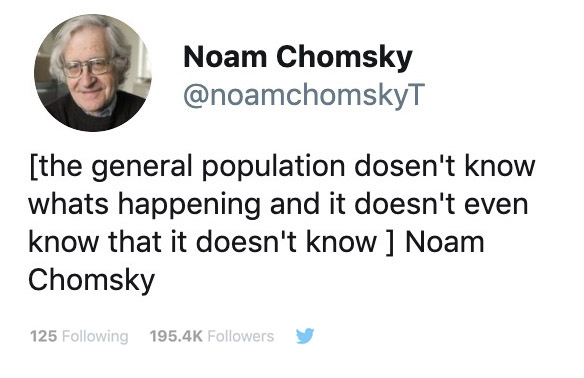
Noam Chomsky 2020 - Twitter Profile

Noam Chomsky 2020 - Twitter Profile
While we certainly do not take the American public as fools, they simply are not knowledgeable enough about the congressional process to understand the partisan maneuvering.David Rohde 2012
Party and Procedure in the United States Congress
Voters in most countries can identify the incumbent chief executive, but know little else beyond that.Jason Brennan 2016
Against Democracy
The fewer the number of taxpayers affected, and the more dull and arcane the subject, the longer the line of lobbyists.Rep Pete Stark 1988
Showdown at Gucci Gulch
If six decades of modern public opinion research establish anything, it is that the general public’s political ignorance is appalling by any standard.Bruce Ackerman & James Fishkin 2004
Deliberation Day
Mass ignorance is the most obvious cause behind the foolishness that marks so much of American politics.Rick Shenkman 2008
Just How Stupid Are We?
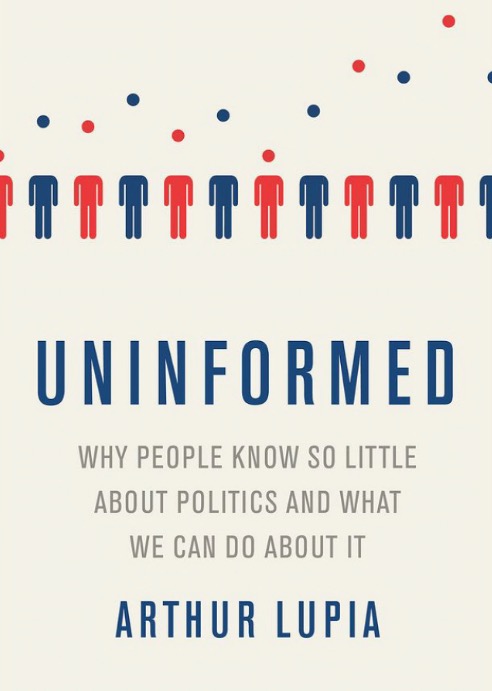
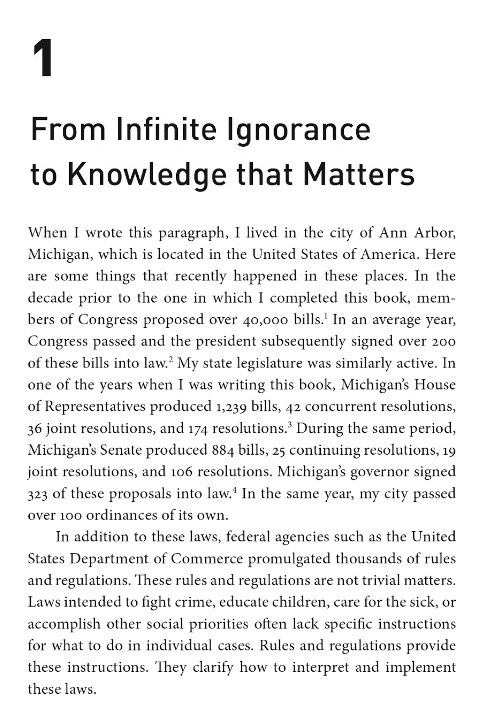
Arthur Lupia 2014 - Uninformed

Arthur Lupia 2014 - Uninformed
The typical citizen drops down to a lower level of mental performance as soon as he enters the political field. He argues and analyzes in a way which he would readily recognize as infantile within the sphere of his real interests. He becomes a primitive again.Joseph Schumpeter 1942
Capitalism, Socialism and Democracy
It’s odd that while citizens regularly criticize their lawmakers for being dishonest and not following through on campaign promises, surveys routinely show that many citizens don’t know who their representative is in the first place (let alone know their position on key votes).Tracy Sulkin 2013
Promises Made, Promises Kept
The unhappy truth is that the prevailing public opinion has been destructively wrong at the critical junctures. The people have imposed a veto upon the judgments of informed and responsible officials. They have compelled the governments, which usually knew what would have been wiser… Mass opinion has acquired mounting power in this century. It has shown itself to be a dangerous master.Walter Lippman 1955
Essays in Public Philosophy
Citizens on average do not have the time, expertise, resources, and interest to make the many decisions required in contemporary governance.Bruce Cain 2014
Democracy - More or Less
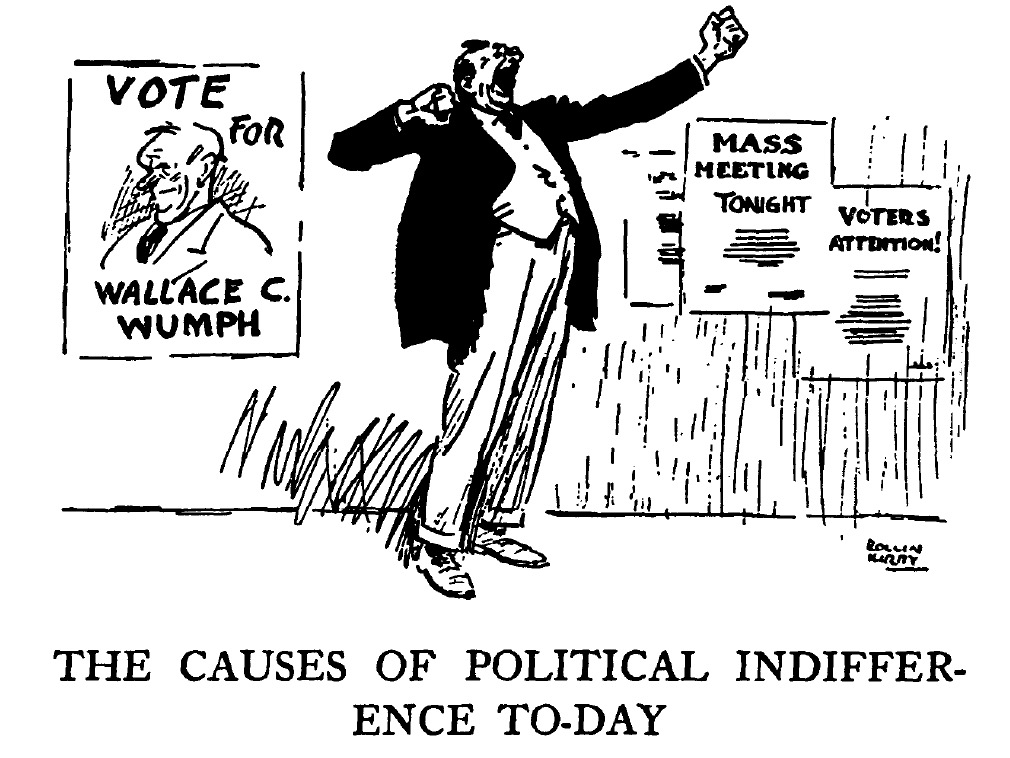
Walter Lippman 1927 - The Causes of Political Indifference

Walter Lippman 1927 - The Causes of Political Indifference
The great body of the people are without virtue and are not governed by any internal restraints of conscience.Rufus King 1787
Constitutional Convention
Political science tells us that the most American citizens neither know, nor care about their political representatives and the policies of their government, and the most importantly, these findings are common knowledge among students of politics.Michael Margolis 1983
Democracy: American Style
The people do not take any great offense at being kept out of the government – indeed they are rather pleased than otherwise at having leisure for their private business.Aristotle 350 BC
Politics
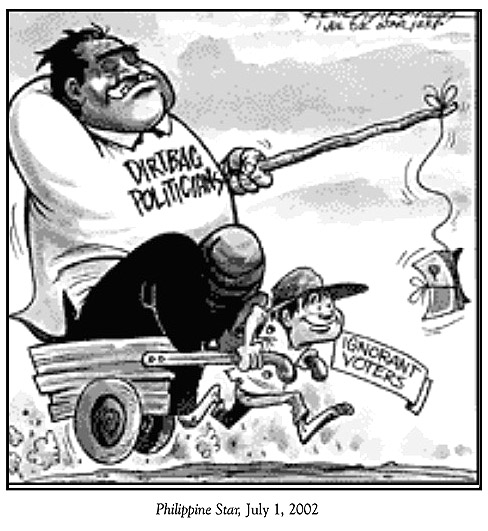
Frederic Charles Schaffer 2002 - Clean Elections and the Great Unwashed

Frederic Charles Schaffer 2002 - Clean Elections and the Great Unwashed
We don’t see strong citizen concern about climate if we look at citizen action. They drive SUVs, live in enormously polluting houses, dispose of plastic bottles. To argue that citizens care and act accordingly is out of step with the data.James D’Angelo 2019
Unrig Summit Nashville
Public opinion research shows us that the public will very often provide majority support for a policy proposal and, simultaneously, provide majority opposition to that same proposal.Richard Longoria 2018
Janus Democracy
When voters endure natural disasters they generally vote against the party in power, even if the government could not possibly have prevented the problem.Christopher Achen & Larry Bartels 2016
Democracy for Realists
The public’s ignorance of political matters has been repeatedly confirmed ever since randomized opinion surveys began in the mid-twentieth century. In 1964, at the height of the Cold War, only 38 per cent of the American public knew that Russia was not a member of NATO. In 1979, only 24 per cent of the public could summarize the First Amendment. In 1989, only 57 per cent of the public knew what a recession was.Jeffrey Friedman 2013
Political Knowledge
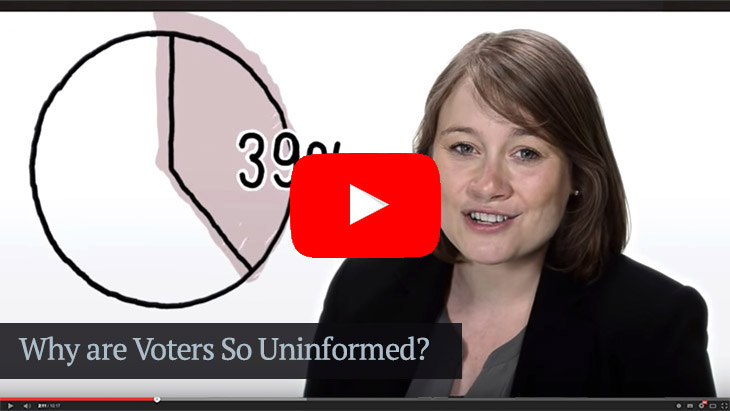
Diana Thomas 2013 - Why Are Voters So Uninformed?

Diana Thomas 2013 - Why Are Voters So Uninformed?
A great vice in most ancient republics was that the people had the right to make resolutions for action, resolutions which required some execution, which altogether exceeds the people’s capacity. The people should not enter the government except to choose their representatives; this is quite within their reach.Montesquieu 1748
Spirit of the Laws
Democratic publics are not in fact able by background or temperament to make large numbers of complex public policy choices; what has filled the void are well-organized groups of activists who are unrepresentative of the public as a whole. The obvious solution to this problem would be to roll back some of the would-be democratizing reforms, but no one dares suggest that what the country needs is a bit less participation and transparency.Francis Fukuyama 2014
Political Order and Political Decay
Decades of political science research should have undermined any naive faith in citizen capacity and made us aware that pluralist realities often overtake populist idealsFrancis Fukuyama 2015
The Limits of Transparency
Party and machine politics are simply the response to the fact that the electoral mass is incapable of action other than a stampede.Joseph Schumpeter 1943
Capitalism, Socialism, and Democracy
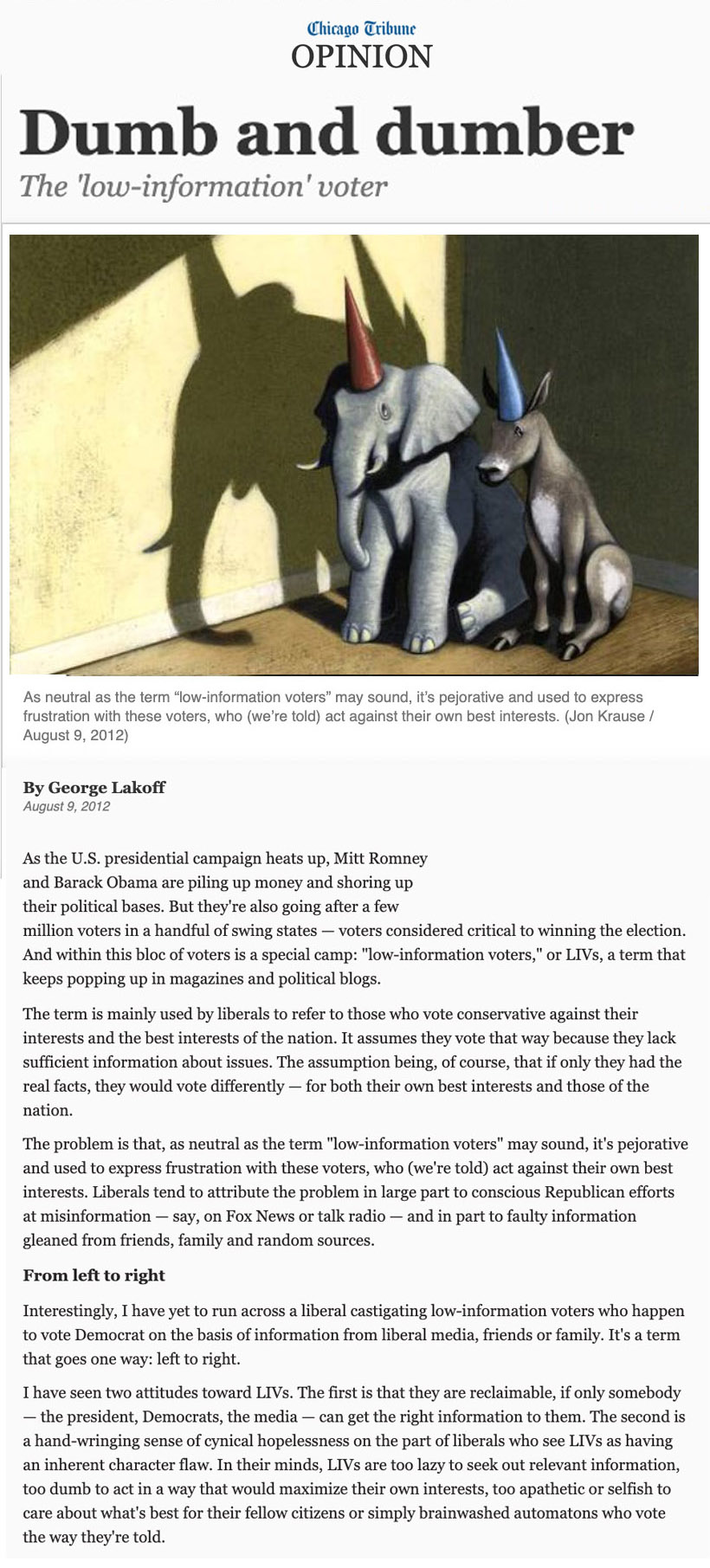
George Lakoff 2012 - Dumb and Dumber

George Lakoff 2012 - Dumb and Dumber
“People in the mass are unconcerned about details,” NIIC spokesmen have assured the NAM in convention assembled. “They tend to think in blurs. They are moved primarily by simple, emotional ideas. The NIIC will capitalize upon this fact with an aggressive program designed to inspire a crusade that will sweep free enterprise into public favor.”Stetson Kennedy 1946
Southern Exposure
Political scientists are repeatedly astonished by the shallowness and incoherence of people’s political beliefs, and by the tenuous connection of their preferences to their votes and to the behavior of their representatives. Most voters are ignorant not just of current policy options but of basic facts, such as what the major branches of government are, who the United States fought in World War II, and which countries have used nuclear weapons.Steven Pinker 2018
Enlightenment Now
Since incumbents characteristically win reelection, constituents may usually be unable to sanction congressmen at the polls for votes which are out of keeping with their wishes. The fact that voters know so little about their congressman's record, furthermore, can be said to indicate that they normally do not control his behavior. Since the congressman rarely receives any kind of specific constituency guidance on how to cast a particular vote, another argument runs, he must fall back on his own devices and is left quite free to decide as he chooses.John Kingdon 1989
Congressmen’s Voting Decisions
Politicians and pundits like to think that the voters are as conscious of political issues and tactics as the experts are, but the real America is an apolitical country whose citizens mostly participate – or don’t – in politics every two or four years on election day.Robert Kaiser 2009
So Much Damn Money
We have seen experimental evidence that survey respondents express a strong preference for transparency – and additional survey evidence that respondents in states with open meetings laws actually seem to know less about legislatures themselves.Justin H. Kirkland, Jeffrey J. Harden 2022
The Illusion of Accountability: Transparency and Representation in American Legislatures
But mandated disclosure is like Kennedy after the Bay of Pigs: “The worse I do, the more popular I get.” Or like Dr. Johnson’s description of second marriages: “the triumph of hope over experience.” For disclosure does not work, cannot be fixed, and can do more harm than good. It has failed time after time, in place after place in area after area, in method after method, in decade after decade. Mandated disclosure’s failure is no stranger than its popularity. Disclosures are the fine print everybody derides, the interminable terms everybody clicks agreement to without reading. Disclosures describe complex facts in complex language; most people little like the former and little understand the latter. Decisions requiring sophistication and expertise cannot be bettered by pelting the unsophisticated and inexpert with data.Omri Ben-Shahar & Carl E. Schneider 2014
More Than You Wanted to Know: Failure of Mandated Disclosure
E. B. White has defined democracy as a “recurring suspicion that more than half of the people are right more than half of the time” This is necessary to our self-image. But there is a difference between recurring suspicion and constant conviction. Issues in these times have become so complicated that many of them are fully understood only by experts and by officials and legislators with staffs of experts at their disposal. The rest of us are sometimes forced to accept their decisions on faith or to oppose them on a hunch that they are wrong.Kenneth G. Crawford 1971
Is “Liberal Reform” All to the Good?
The silent majority is not going to be present at the open markups of the bills; they are going to be too busy and too occupied otherwise. But if you have open markup on bills...do you not think that the special interests will be there? The silent majority will not be there, but the special interests will be well represented.Rep George Mahon 1970
Congress & the People
For the most recent edition of “Lie Witness News,” Kimmel sent his team out to Hollywood Boulevard to ask people if they had voted in the midterms. Several of the participants were quick to decree that they had already gone to the polls that morning. But there was one major problem: It wasn’t election day.Megan McCluskey 2018
Lie Witness News
In the United States, most Americans oppose “welfare” but support “aid to the poor.” They want to decrease spending on foreign aid and increase spending on foreign aid. They want to amend the Constitution but oppose changing it. They oppose regulations that harm businesses but they also support regulations that protect the public. Contradictory findings like these have puzzled students of public opinion for decades. On too many issues there doesn’t seem to be any there “there.” The public just doesn’t make any logical sense. This leads many to conclude that the public simply has no idea what it is talking about. Richard Longoria 2018
Janus Democracy
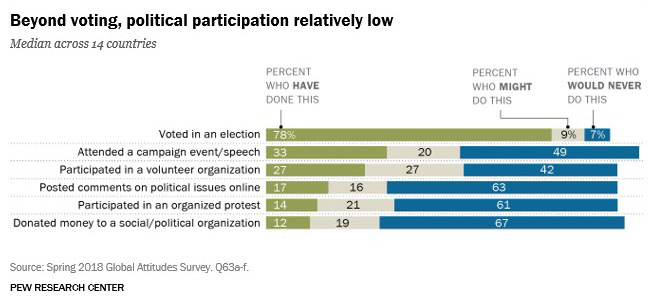
Pew Research Center 2018

Pew Research Center 2018
As noted, most voters are not informed, especially about projects that don’t affect them very much.Deborah Walker 2020
Public Choice - Logrolling
This is the dirty little secret of our profession. Among political scientists, that most voters are woefully ignorant about politics is completely uncontroversial, and has been for decades. The survey evidence on this subject is overwhelming. Yet it is not something widely disseminated, and a good deal of effort in the discipline is devoted to scrounging for reasons why the severe knowledge deficits of voters don’t matter all that much, and why Washington will be attentive to voters’ demands even if most voters are not very well informed and not paying all that much attention. Jacob Hacker & Paul Pierson 2010
Winner-Take-All Politics
In transparency models and narratives, the ‘public’, rather than representing an adjective to describe a certain social and political sphere, is instead understood as a noun to denote a group of people. This group of people is assumed to see its relationship to the state as a contract that it is willing to enforce by using democratic leverage to hold government to account and uphold the principals of good governance. It is unlikely, however, that such a public can be found in any pure form outside the abstract models of political scientists and the discourse of policymakers (Fenster 2015; Fox 2015). It is therefore problematic for policymakers to assign to citizens beliefs, interests and incentives, and a specific relationship to the state based on some kind of moral responsibility or ‘public duty’ to mobilize and participate in what essentially needs to be a collective action for change. Paivi Lujala and Levon Epremian 2017
Transparency and natural resource revenue management: empowering the public with information?
Despite the late hour, the marble-lined committee room is packed to the doors with ‘people,’ and guards are stationed at the entrance to stop more from pushing in. Reporters sit cheek-by-jowl around two tables not far from the door, and the remainder of the room is filled with lobbyists – lots of lobbyists. [No constituents are present]Jeffery Birnbaum & Alan Murray 1988
Showdown at Gucci Gulch (1986 Tax Reforms)
Trial judges hand out more prison and jail time to defendants just before they come up for reelection...In spite of the tremendous power wielded by trial court judges the study showed that “voters are almost entirely uninformed about judge behavior.” [But] because voters tend only to evaluate a judge’s performance just prior to election most judges ignore constituent preferences while in office then try to portray a “tough on crime” stance just prior to the election.Gary Hunter 2009
Elected Judges More Punitive Just Before Elections
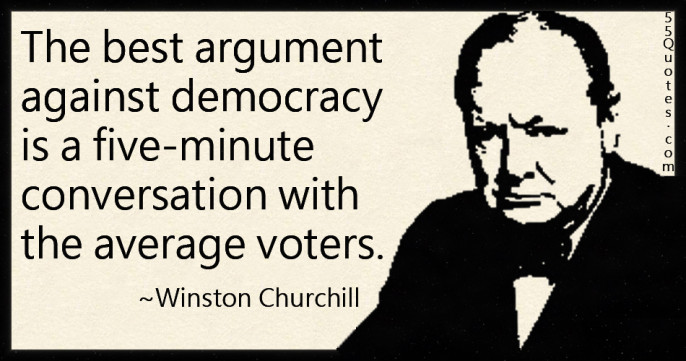
Winston Churchill

Winston Churchill
Between the lobbyists, who arrived early and stayed all day seeking scarce committee room seats, and platoons of staff and press, Senate committee sessions were well attended – but not by the general public. Except for those whose livelihoods depended on it, there wasn’t much interest in the tax code arcania.Martha Hamilton 1984 – The Washington Post
Opening Up Congress
In theory, every citizen makes up his mind on public questions and matters of private conduct. In practice, if all men had to study for themselves the abstruse economic, political, and ethical data involved in every question, they would find it impossible to come to a conclusion about anything. Edward Bernays 1928
Propaganda*NOTE: Bernays insisted that the public could be controlled because they are not just unwilling to follow the inner-workings of government, but they are also unable to do so. He was hired by business to fight back against the New Deal and manipulate the masses into believing that business not government was the reason why America was so successful.
There's a good reason why nobody studies history, it just teaches you too much.Noam Chomsky 2020
Nobody Studies History
We survey a substantial body of scholarly work demonstrating that most democratic citizens are uninterested in politics, poorly informed, and unwilling or unable to convey coherent policy preferences through “issue voting.” How, then, are elections supposed to ensure ideological responsiveness to the popular will? In our view, they do not. The populist ideal of electoral democracy, for all its elegance and attractiveness, is largely irrelevant in practice, leaving elected officials mostly free to pursue their own notions of the public good or to respond to party and interest group pressures.Christopher Achen & Larry Bartels 2016
Democracy for Realists
Democratic opportunities can be hijacked for individual gain and special interests. The naive assumption that citizens will live up to highly idealized expectations of citizen responsibility can lead to democratic capture and distortion. DemocraciesBruce Cain 2014
The Transparency Paradox
Democracy for Realists assails the romantic folk-theory at the heart of contemporary thinking about democratic politics and government, and offers a provocative alternative view grounded in the actual human nature of democratic citizens. Christopher Achen and Larry Bartels deploy a wealth of social-scientific evidence, including ingenious original analyses of topics ranging from abortion politics and budget deficits to the Great Depression and shark attacks, to show that the familiar ideal of thoughtful citizens steering the ship of state from the voting booth is fundamentally misguided. They demonstrate that voters―even those who are well informed and politically engaged―mostly choose parties and candidates on the basis of social identities and partisan loyalties, not political issues. They also show that voters adjust their policy views and even their perceptions of basic matters of fact to match those loyalties. When parties are roughly evenly matched, elections often turn on irrelevant or misleading considerations such as economic spurts or downturns beyond the incumbents' control; the outcomes are essentially random. Thus, voters do not control the course of public policy, even indirectly.Christopher Achen & Larry Bartels 2016
Democracy for Realists
We require so many of our institutions to be chosen through elections, for example, on the view that “citizen” control will keep officials hewing closer to the common good, without any realistic assessment of how the electoral process actually works; with romanticized views of how much interest most citizens will take (or rather, fail to take) in voting for lower-level offices; and without regard for the degree to which organized private interests will be able to dominate in low turnout, low salience elections.Richard H. Pildes 2013
Romantacizing Democracy
In general, voters are ignorant, misinformed and biased. But there is tremendous variance. When it comes to political information, some people know a lot, most people know nothing and many people know less than nothing.Jason Brennan 2016
Against Democracy
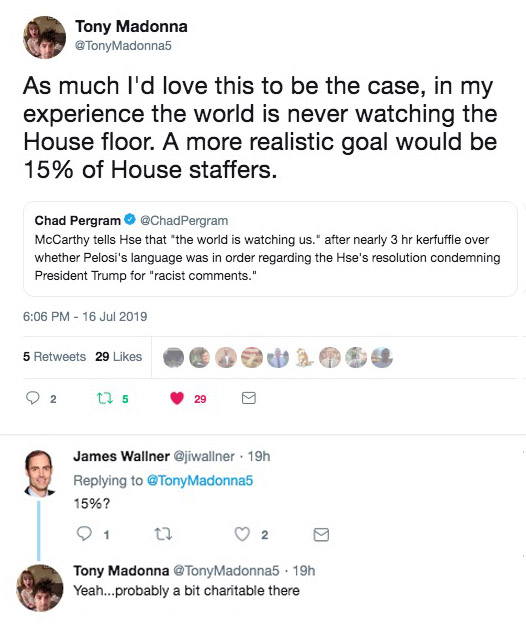
Anthony Madonna 2019 - The World is Never Watching

Anthony Madonna 2019 - The World is Never Watching
Citizens aren’t just ignorant or misinformed, but irrational. Few citizens process information with an open mind; most citizens disregard any information that contradicts their current ideology. Voters suffer from a wide range of biases, including confirmation bias, disconfirmation bias, motivated reasoning, intergroup bias, availability bias and prior attitude effects.Jason Brennan 2016
Against Democracy
“The people,” Roger Sherman told the Convention, “should have as little to do as may be about the government. They want information and are constantly liable to be misled.”Neil MacNeil 1963
Forge of Democracy
The broad public simply is not able to monitor congressional activity with nearly the consistency or intensity of organized interests.Frances Lee (Princeton) 2019
Select Committee on the Modernization of Congress
A 1973 citizenship examination administered by the National Assessment of Educational Progress showed that teenagers and young adults “know frighteningly little about the personalities or policies of governmental leaders, and have not even begun to understand the workings of the American political process.”Ronald Garay 1984
Congressional Television
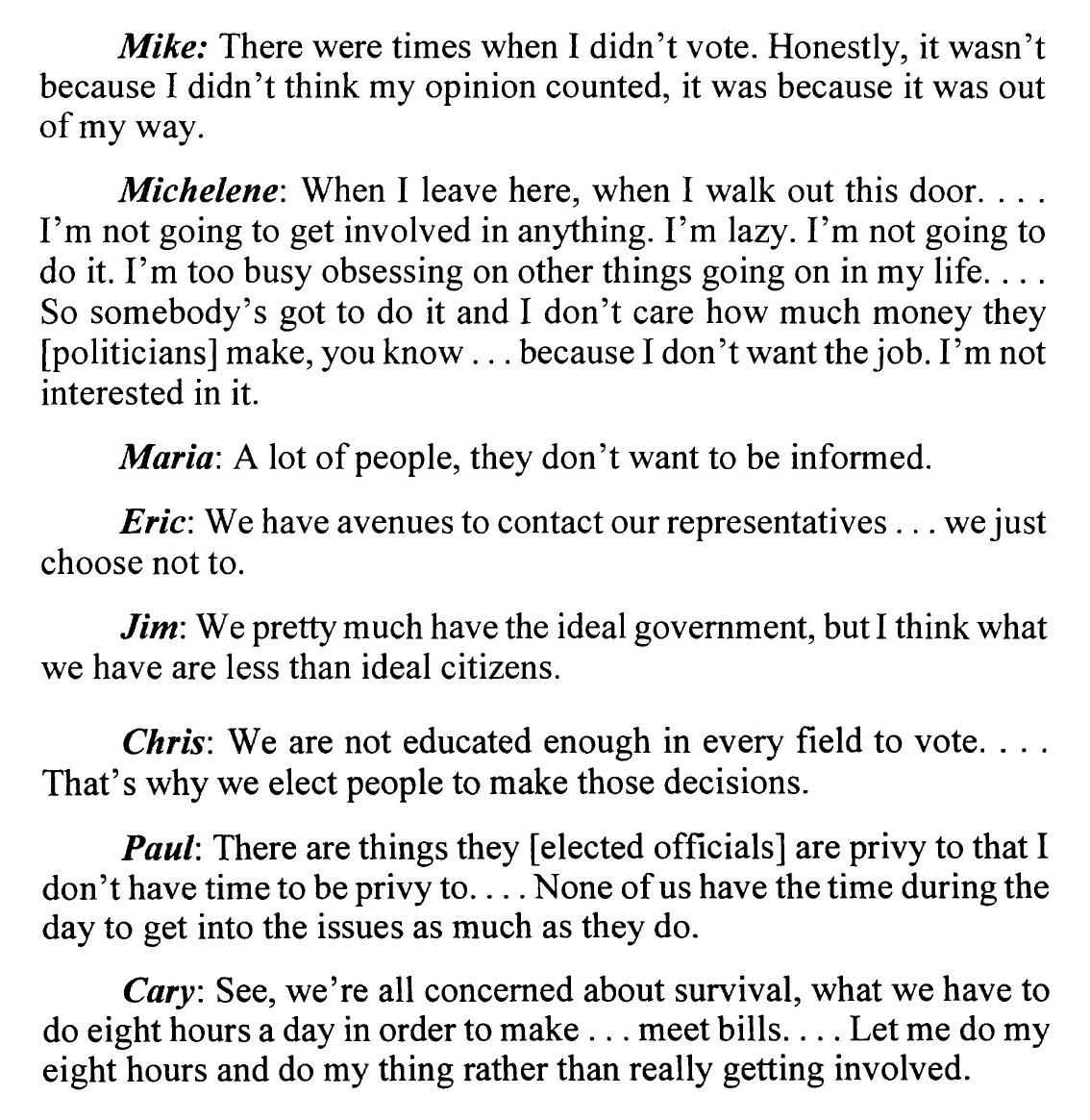
John Hibbing 2002 - Survey of Americans on their participation in government

John Hibbing 2002 - Survey of Americans on their participation in government
As a rule, we can suppose. that most citizens know very little about politics and policies. Indeed, an informal survey suggests that most of my professional political science colleagues do not recall the congressional attack on the IRS, which was front-page news a few years ago.Russell Hardin 2007
The Economics of Transparency in Politics
Earnest and able democratic citizens will often lack the time to choose representatives wisely... Moreover, well-meaning but untutored, unsure, or merely busy, citizens can easily be led astray by political partisans; and in a democracy, they tend to be swayed by partisans who advocate the unlimited expansion of popular power. Democratic citizens will constantly be urged, and tempted, to press for increasing the power of the majority without being able to assure its wisdom or justice.Harvey Mansfield & Delba Winthrop 2000
Tocqueville: Democracy in America
The facts are significant. According to the last census, there are in America over fifty-four millions of men and women classed as citizens of twenty-one years of age and over. In the last election of November, 1920, despite the fact that we were keyed up by a great war, and despite the fact that the foreign policy of the nation at issue was of greater importance than any problem which had confronted the voter for a generation, and also despite the large expenditure of money by the two parties, only 26,000,479 voters went to the polls. In other words less than one half of those who could vote, voted. And consider what happens in a local election. On an average, not more than one tenth of our voters attend party primaries. In Boston less than one third of the registered voters cast their vote for city councilmen or school committeemen in a recent minor election.Samuel Spring 1922
The Voter Who Will Not Vote (Harper’s)
Nowhere and at no time in the history of the colonies did any newspaper or magazine report one single assembly debate. We have noticed a few fragmentary exceptions when speeches made in assemblies were cited in the course of political polemics. But these were individual speeches, not debates, and do not constitute an exception to the rule. Colonial editors were…certainly aware that such communication was possible…They could, however, have provided an outlet for members who wanted their speeches published, but this was not done either. In general, it appears that the demand did not exist. J.R. Pole 1983
The Gift of Government
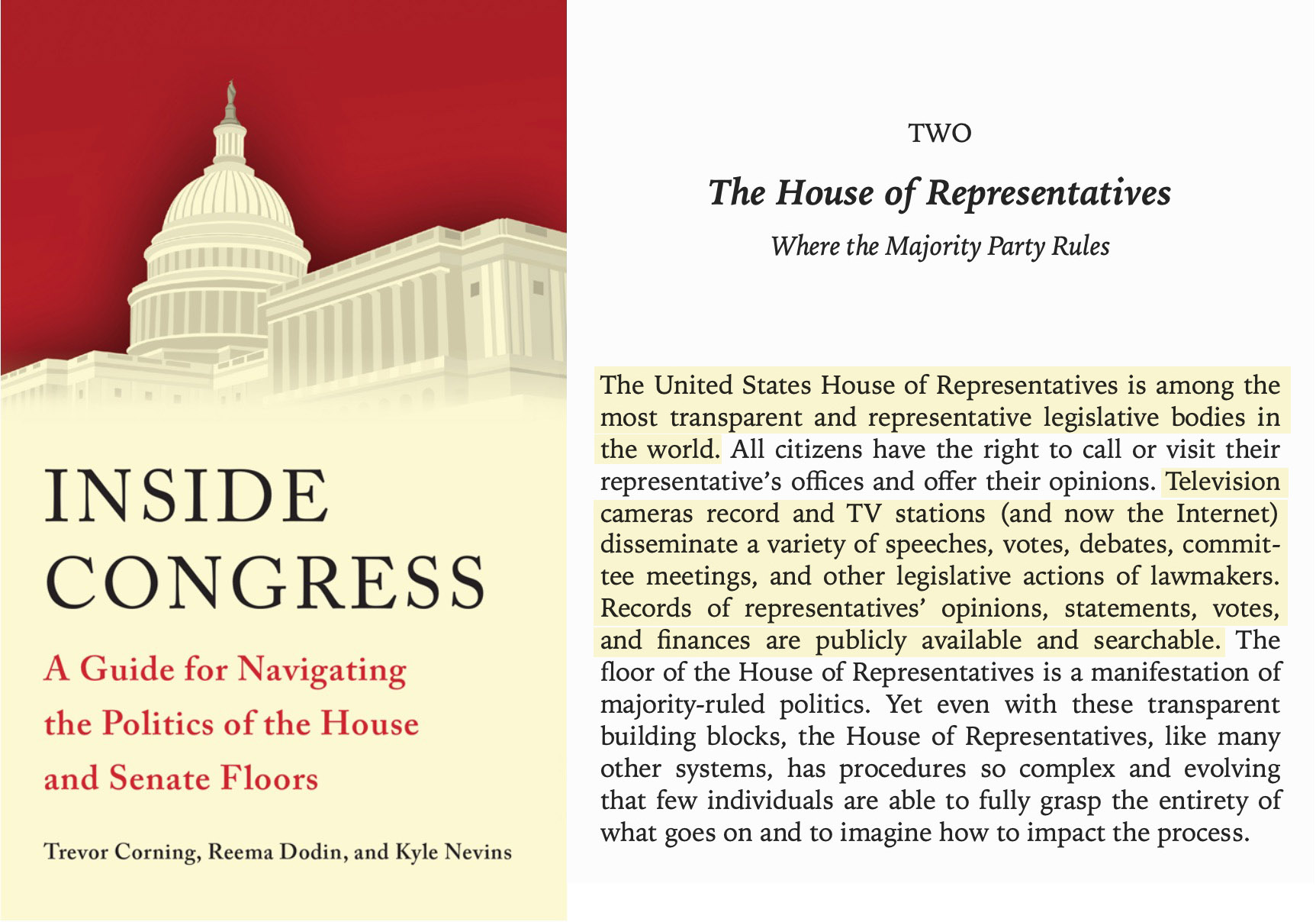
Trevor Corning, Reema Dodin & Kyle Nevins 2017 - Inside Congres

Trevor Corning, Reema Dodin & Kyle Nevins 2017 - Inside Congres
Rep. Tauke said “An interest group with a specific issue will be very motivated to make its views known and learn what happened. The general public is not so motivated… But behind closed doors, lobbyists don’t know everything that is going on.”Richard Cohen 1994 p131
Washington at Work: Back Rooms and Clean Air*NOTE: This citation refers to the successful passage of the 1990 Clean Air Amendments (the most powerful environmental legislation in the past 40 years), which were brokered almost exclusively behind closed doors by Mitchell and others expressly to avoid the pressure of lobbyists. Full citation can be found here.
Even with the impressive growth of C-SPAN, which provides, via cable TV, admission to the House and Senate galleries for more than 54 million homes, the public’s awareness of Congress remains shallow.Richard Cohen 1994
Washington at Work: Back Rooms and Clean Air
Grave responsibilities are imposed upon the legislator by the fact that the public rarely has any useful opinion in matter of detail... Indeed, the ignorance of the public about [matters] is one of the causes of [secrecy’s] usefulness.Robert Luce 1926
Congress: An Explanation
When it comes to political information there are two groups of people. One group is almost completely ignorant of almost every detail of almost every law and policy under which they live. The other group is delusional about how much they know. There is no third group... every one of us is almost completely ignorant of almost every detail of almost every law and policy under which we live.Arthur Lupia 2014
Uninformed: Why People Know So Little About Politics
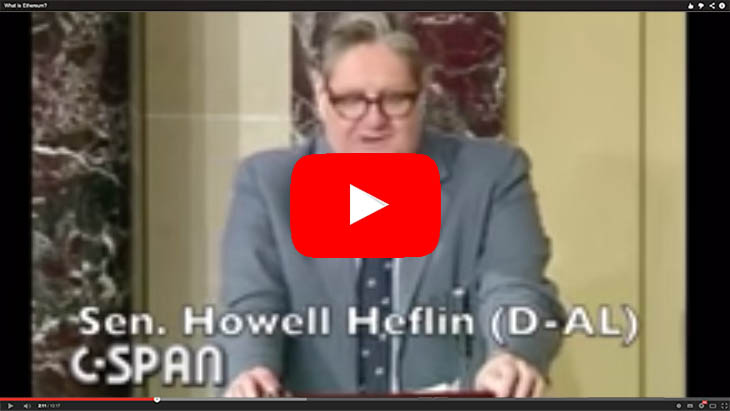
Senator Howell Heflin 1986 - A Sonnet on Transparency
Turn the spotlight over here.
Focus the camera at my place.
Pages, please don’t come near,
Otherwise, you just might block my face.
Some have made the worst claim yet,
That viewers will tire from the dull plot,
But I’ll be willing to make a bet
Lobbyists will watch a whole lot.

Senator Howell Heflin 1986 - A Sonnet on Transparency
Focus the camera at my place.
Pages, please don’t come near,
Otherwise, you just might block my face.
Some have made the worst claim yet,
That viewers will tire from the dull plot,
But I’ll be willing to make a bet
Lobbyists will watch a whole lot.
Even world-renowned experts on specific legal or political topics are almost completely ignorant of almost all of the details of the many laws, rules, and regulations under which any of us live.Arthur Lupia 2014
Uninformed: Why People Know So Little About Politics
Somewhat surprisingly, perhaps, the poll also showed that many Americans are still not paying close attention to tax reform. Only one out of ten reported that they were very familiar with the tax-reform packages before Congress, and 36% said they were not familiar at all.Evan Thomas 1986
Lights, Cameras, Tax Reform!
To some extent, the elites keep the people from implementing dumb policies, policies the people support only because they’re badly informed. Jason Brennan 2016
What History Teaches Us About Demagogues
In theory, democracy is a bulwark against socially harmful policies. In practice, however, democracies frequently adopt and maintain policies that are damaging. How can this paradox be explained? The influence of special interests and voter ignorance are two leading explanations...The central idea is that voters are worse than ignorant; they are, in a word, irrational – and they vote accordingly. Despite their lack of knowledge, voters are not humble agnostics; instead, they confidently embrace a long list of misconceptions.Bryan Caplan 2007
The Myth of the Rational Voter
More systematically, the most recent National Assessment of Educational Progress (NAEP) tests found that fewer than a quarter of eighth- and twelfth-graders nationally could be considered “proficient or above” in civics, and the results were even worse for some sub-groups. This is not a result of recent churns in federal education law, by the way – these figures were just as bad, even a little worse, when the test was first given in 1998. In fact, the 1996 book What Americans Know About Politics and Why It Matters found the answer to the first part of its title had always been “not much”; fifty years of political science survey research had documented that “levels of information about public affairs are... astonishingly low.” A famous study of the 1948 election by Bernard Berelson, Paul Lazarsfeld, and William McPhee concluded that “voters today seem unable to satisfy the requirements for a democratic system of government.” Andrew Rudalevige 2017
Too many Americans know too little about the Constitution
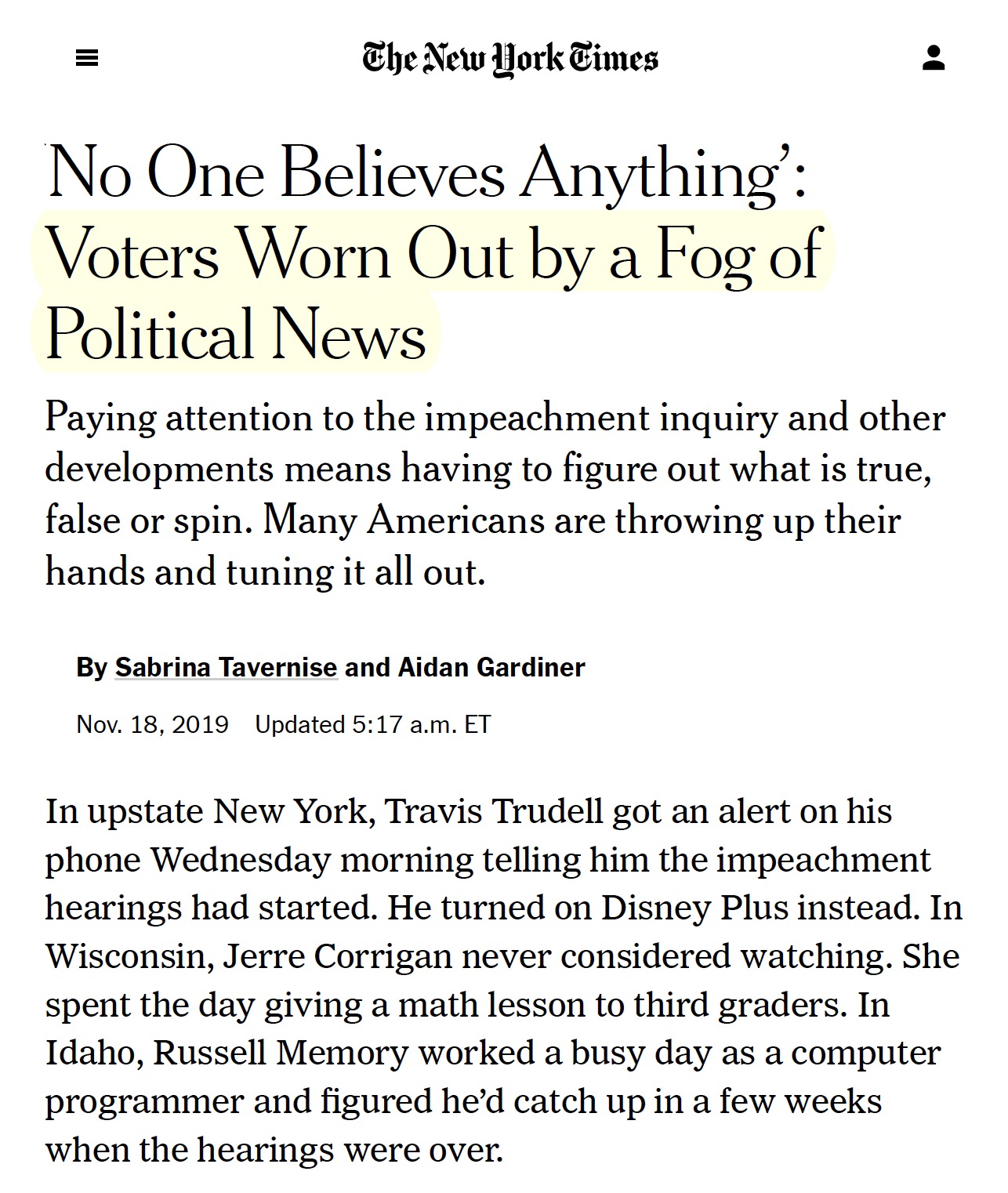
Voters Worn Out - New York Times 2019

Voters Worn Out - New York Times 2019
The last thing people want is to be more involved in political decision making: They do not want to make political decisions themselves; they do not want to provide much input to those who are assigned to make these decisions; and they would rather not know all the details of the decision-making process. Most people have strong feelings on few if any of the issues the government needs to address and would much prefer to spend their time in nonpolitical pursuits.John Hibbing & Elizabeth Theiss-Morse 2004
Stealth Democracy
Transparency undermines expertise in a significant way, because it confines experts using the kinds of reasons that nonexperts can understand. But if you think about it for a second, you should realize that a lot of expert reasoning is by its nature, incomprehensible to the public.C. Thi Nguyen 2021
Transparency is Surveillance
Evidence of the people’s desire to avoid politics is widespread, but most observers still find it difficult to take this evidence at face value. People must really want to participate but are just turned off by some aspect of the political system, right? If we could only tinker with the problematic aspects of the system, then the people’s true participatory colors would shine for all to see, right? As a result of this mindset, when the people say they do not like politics and do not want to participate in politics, they are simply ignored. Elite observers claim to know what the people really want – and that is to be involved, richly and consistently, in the political arena. If people are not involved, these observers automatically deem the system in dire need of repair.John Hibbing & Elizabeth Theiss-Morse 2004
Stealth Democracy
The House not only has opened up internally to invite broader participation among its members but has also opened much of its operations to inspection by the press and the public. The problem remains for both members and the public to monitor committee action in the House because so much is going on at once. In 1975 a record 3,881 open meetings of House committees and subcommittees made the job of participant, reporter, or citizen most difficult.Lawrence Dodd & Bruce Oppenheimer 1977
Congress Reconsidered – 1st Ed
The creation of a multiplicity of committees makes it difficult for the public or the press to follow policy deliberations even if they are open.Lawrence Dodd 1977
Congress Reconsidered – 1st Ed
Nothing in the empirical record suggests that citizens are at all well informed regarding the people, politics, and procedures of Congress.Jeffery Mondak 2007
Does Familiarity Breed Contempt?
Voters are woefully uninformed about the voting behavior of their elected members. This position is put succinctly by Miller and Stokes (1963, 47): “Far from looking over the shoulder of their Congressmen at the legislative game, most Americans are almost totally uninformed about legislative issues in Washington.” Reporting results from a survey of 100 members of Congress, Matthews and Stimson (1975, 28) report that “79 percent said their constituents seldom knew or cared how they voted.” More recently, Dancey and Sheagley (2013) find most voters cannot correctly identify how senators voted on important roll call votes when they adapt positions contrary to their party. Similarly, using a survey of 30,000 respondents, Highton (2018) reports little evidence linking roll call votes, voter preferences and member vote share. As voters lack the ability to monitor, instead of providing an opportunity to express sincere positions members view roll call votes as an opportunity to “position-take” for other elites (Mayhew 1974).
Outside groups consisting of think tanks, interest groups and campaign donors are far more reliable in terms of monitoring member actions. In the contemporary U.S. Congress, there are over a hundred different interest groups that track member votes (Davidson, Oleszek, Lee and Schickler 2013). The result is that member roll call votes are prominently featured in a large number of attack ads. A common tactic is to feature how often a member voted with an unpopular national figure, like a President or the Speaker of the House (Carson, Crespin and Madonna 2014). For example, in 2014, Republicans put out an advertisement asserting that Rep. John Barrow (D-GA) voted with President Barrack Obama 85 percent of the time (Jacobson 2014). And although he supported Republican John McCain’s presidential campaign in 2008, Rep. Gene Taylor (D-MS), was still attacked in campaign ads for voting with former House Speaker Nancy Pelosi 82 percent of the time (Taylor 2010).Michael Lynch, Anthony Madonna & Kisaalita 2018
Broken Record - Transparency, Position Taking and Recorded Voting in the US Congress (THE LINKED PAPER (2017) IS DIFFERENT FROM THE UPDATED VERSION (2018))
Consitituents generally do not and cannot follow the development of information and arguments on an issue.Larry Milbrath 1963
The Washington Lobbyists
Instead, I examined the role of voters’ ignorance of their representatives’ corruption. American voters are (in)famously uninformed about politics. What I found is that voters’ inattentiveness to politics is strongly associated with lower propensity to vote against a corrupt incumbent.Marko Klašnja 2017
Voters’ Ignorance
There is then nothing particularly new in the disenchantment which the private citizen expresses by not voting at all, by voting only for the head of the ticket, by staying away from the primaries, by not reading speeches and documents, by the whole list of sins of omission for which he is denounced. I shall not denounce him further. My sympathies are with him, for I believe that he has been saddled with an impossible task and that he is asked to practice an unattainable ideal. I find it so myself for, although public business is my main interest and I give most of my time to watching it, I cannot find time to do what is expected of me in the theory of democracy; that is, to know what is going on and to have an opinion worth expressing on every question which confronts a self-governing community. And I have not happened to meet anybody, from a President of the United States to a professor of political science, who came anywhere near to embodying the accepted ideal of the sovereign and omni-competent citizen.Walter Lippman 1925
The Phantom Public
For the real environment is altogether too big, too complex, and too fleeting for direct acquaintance. We are not equipped to deal with so much subtlety, so much variety, so many permutations and combinations. And although we have to act in that environment, we have to reconstruct it on a simpler model before we can manage it.Walter Lippman 1922
Public Opinion
So I have been reading some of the new standard textbooks used to teach citizenship in schools and colleges. After reading them I do not see how anyone can escape the conclusion that man must have the appetite of an encyclopedist and infinite time ahead of him. To be sure he no longer is expected to remember the exact salary of the county clerk and the length of the coroner’s term. In the new civics he studies the problems of government, and not the structural detail. He is told, in one textbook of five hundred concise, contentious pages, which I have been reading, about city problems, state problems, national problems, international problems, trust problems, labor problems, transportation problems, banking problems, rural problems, agricultural problems, and so on ad infinitum. In the eleven pages devoted to problems of the city there are described twelve sub-problems.Walter Lippman 1925
The Phantom Public
Legislators in Bolivia and Colombia – even those who strongly favored recorded voting themselves – described a general lack of public attention to individual legislators’ voting behavior. Nevertheless, there are pockets of interest. Organized interest groups – unions, business organizations, and farmers’ groups – sometimes monitor legislative voting, even in systems where no records are kept, and lobby legislators and party leaders to support their demands.John M. Carey 2009
Legislative Voting and Accountability
The usual appeal to education can bring only disappointment. For the problems of the modem world appear and change faster than any set of teachers can grasp them, much faster than they can convey their substance to a population of children. If the schools attempt to teach children how to solve the problems of the day, they are bound always to be in arrears.Walter Lippman 1925
The Phantom Public
When Congress is engaged in meaningful debate, when it is being newsworthy by passing important legislation and by checking presidential power, people are least happy with the institution. One writer correctly observes “the less people hear from Congress, the higher Congress’ ratings soar.”John Hibbing and James Smith 2001
What the American Public Wants Congress to Be
Full Article
The United States House of Representatives is among the most transparent and representative legislative bodies in the world. All citizens have the right to call or visit their representative’s offices and offer their opinions. Television cameras record and TV stations (and now the Internet) disseminate a variety of speeches, votes, debates, committee meetings, and other legislative actions of lawmakers. Records of representatives’ opinions, statements, votes, and finances are publicly available and searchable. The floor of the House of Representatives is a manifestation of majority ruled politics. Yet even with these transparent building blocks, the House of Representatives, like many other systems, has procedures so complex and evolving that few individuals are able to fully grasp the entirety of what goes on and to imagine how to impact the process. Trevor Corning, Reema Dodin & Kyle Nevins 2017
Inside Congress
Public opinion research shows that voters are poorly informed about their representative’s votes on even the most highly visible legislation (Ansolabehere and Jones 2010; Jones 2011; Sulkin 2009),Michael Lynch & Anthony Madonna 2017
Broken Record
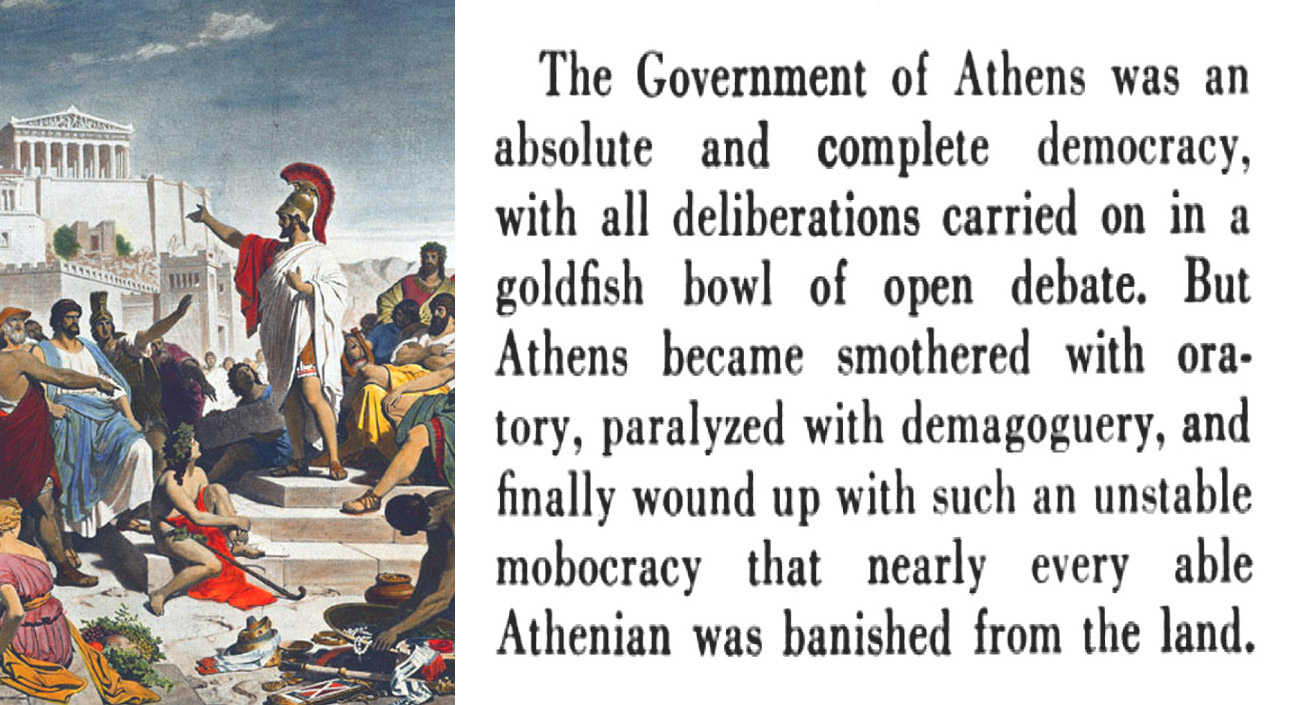
Jenkin Lloyd Jones 1957 on the failure of Greek transparency

Jenkin Lloyd Jones 1957 on the failure of Greek transparency
Most Americans have neither the time, the interest, nor the inclination to monitor Congress on a day-to-day basis. But lobbyists and activists do, and they can use the information and access to ensure that the groups they represent are well taken care of in the federal budget and the legal code. This is true not only for lobbies that want money. On any number of issues, from tort law to American policy toward Cuba to quotas, well organized interest groups – no matter how small their constituencies can ensure that government bends to their will. Reforms designed to produce majority rule have produced minority rule.Fareed Zakaria 2003
Future of Freedom
The unthinking multitude...domestic cattle...Laziness and cowardice are the reasons why such a large part of mankind gladly remain minors all their lives.Immanuel Kant 1784
What Is Enlightenment?
The mass public contains...a great many more people who know next to nothing about politics...The average American’s ability to place the Democratic and Republican parties and ‘liberals’ and ‘conservatives’ correctly on issue dimensions and the two parties on a liberal-conservative dimension scarcely exceeds and indeed sometimes falls short of what could be achieved by blind guessing. The verdict is stunningly, depressingly clear: most people know very little about politics.Robert Luskin 2002 Thinking About Political Psychology
How can citizens control legislators when most citizens pay scant attention to public affairs? Why should legislators worry about citizens’ preferences when they know most citizens are not really watching them?Douglas Arnold 1993
Can Inattentive Citizens Control Representatives?
Efforts to publicize government performance can become “data dumps” such that the average legislator or citizen finds it nearly impossible to find specific, useful information. There has been an explosion of data in government. While there is certainly nothing inherently wrong with providing more performance data, often the form in which the data is provided makes it very difficult to locate specific information. In too many cases, websites focused on government performance are simply a collection of long government performance reports. It requires someone with a thorough knowledge of the organization of the jurisdiction (which agency is responsible?) and the policy area in question (what‘s a good performance measure?) to find and interpret these data.Philip Joyce 2015
The Dark Side of Government in the Sunshine
The 1990 Clean Air Act was about 800 pages long, and nonexperts would need a translator to make sense of it.Barbara Sinclair 2006
Unorthodox Lawmaking
Politicians know the American people, millions of them, don’t know very much and they count on that, and that's why they use bumper stickers and slogans and they appeal to fear...You can’t have a rational discussion with the American people because it goes over their head...only 2 out of 5 voters can name the three branches of the federal government.Rick Shenkman 2016
The Open Mind
It is necessary to say that people are deluded and that the task of leadership is to un-delude them.James Traub 2016
It’s Time for the Elites to Rise Up Against the Ignorant Masses
Further evidence of the emergence of a somewhat different institutional climate in which concerns with restoring decisionmaking capabilities had begun to compete with demands for openness, participation, and decentralization came in 1983, when the return by the Ways and Means Committee to the traditional practice of closing bill-writing sessions to the public excited little interest or criticism.Randall Strahan 1989
The New Ways and Means
The problem is, of course, is that if Americans aren’t paying attention, they can’t hold anybody accountable...If we use statistics on what the people don’t know...the statistics are just appalling.Rick Shenkman 2008
CNN (How Stupid Are Americans)
During election years, most citizens cannot identify any congressional candidates in their district. Citizens generally don’t know which party controls Congress. During the 2000 U.S. presidential election, while slightly more than half of all Americans knew Gore was more liberal than Bush, significantly less than half knew that Gore was more supportive of abortion rights, more supportive of welfare-state programs, favored a higher degree of aid to blacks or was more supportive of environmental regulation. When asked to guess what the unemployment rate was, the majority of voters tend to guess it is twice as high as the actual rate.Jason Brennan 2016
Against Democracy
Less than 30% of Americans can name two or more of the rights listed in the First Amendment of the Bill of Rights.Jason Brennan 2016
Against Democracy
Things are worse than [survey] numbers indicate. Simple surveys of voter knowledge — such as Pew Research Center polls or the American National Election Studies (ANES) – tend to overstate how much Americans know. One reason these surveys overstate voter knowledge is that they usually take the form of a multiple-choice test. When many citizens do not know the answer to a question, they guess. Some of them get lucky, and the surveys mark them as knowledgeable. Imagine I administer a twelve-question test to ten thousand voters, and each question has three choices for an answer. Now suppose the average American gets four out of twelve questions correct. It might be that the average American knows the answer to four questions, but this is indistinguishable from them guessing at random.Jason Brennan 2016
Against Democracy
But are the people really populists and would enactment of the populist reform agenda really make Congress more popular? Recently collected data suggest the answer to both questions is no. These data consist of a specially designed national survey and numerous focus groups held across the country. In their survey responses and in their focus group comments, the people left the clear impression that the last thing they want is more involvement in the political process. Accountability and the representation of varied views were far from their minds. They did not have a particularly charitable view of their fellow citizens, and they certainly did not perceive them as well-situated to make informed and enlightened public policy decisions. They betrayed no motivation to study the issues more, to spend more time listening to candidate debates, to discuss the issues themselves, or to be more intimately involved in any way with the political process.John Hibbing 2002
How to Make Congress Popular
The evidence is clear, most Americans know very little about politics and many don’t have any interest in politics at all. Most Americans can’t identify which party is in control of Congress. This makes it difficult for voters to assign credit or blame for their performance. They are notoriously bad at estimating how much is spent on various programs, and they overestimate the cost of some programs, like the Corporation for Public Broadcasting, while underestimating the cost of others, like Social Security. They are ignorant about the basic structure of government and can’t identify many of the rights citizens have or the limits that the Constitution imposes on the government. They don’t know what is in specific pieces of legislation, like the American Reinvestment and Recovery Act of 2009, and attribute legislation to the wrong elected official-many believe the Troubled Asset Relief Program (TARP) was enacted during the Obama administration. A majority of Americans incorrectly believed that President Bush claimed there was a “link between Saddam Hussein and the September 11 attacks.” Voters can’t hold their elected officials responsible if they can’t identify their elected officials, don’t know what is in legislation, and don’t know which elected officials supported which government programs. Richard Longoria 2018
Janus Democracy
[The people] know nothing about government or current events. They can't follow arguments of any complexity. They stuff themselves with slogans and advertisements. They eschew fact for myth. They operate from biases and stereotypes, and they privilege feeling over thinking. The result is a political system of daunting irrationality.Louis Bayard 2008
Too Dumb to Vote
Voters consistently misperceived where candidates stood on important issues.Larry Bartels 2008
How Smart is the American Voter?
The complexity and incoherence of our government often make it difficult for us to understand just what that government is doing... one need look no further than the mind-numbing complexity of the health-care system, or our byzantine system of funding higher education, or our bewildering federal-state system of governing everything from welfare to education to environmental regulation. America has chosen to govern itself through more indirect and incoherent policy mechanisms than can be found in any comparable country.Steven M. Teles 2013
Kludgeocracy in America
Madison’s principal reason for deifying the Founders was his belief that the people could not be trusted to intelligently rule themselves.Michael J. Klarman 2016
The Framers’ Coup
Transparency, unlike other forms of regulation, has a major disadvantage: it assumes that those who receive the information released by producers or public officials can properly process it and that their conclusions will lead them to reasonable action. However, the well-known and often-cited findings of behavioral economics demonstrate that very often the public is unable to properly process even rather simple information because of “wired in,” congenital, systematic cognitive biases.Amitai Etzioni 2010
Is Transparency the Best Disinfectant?
One of the folk arguments for electing government officials is “accountability.” Citizens, the story goes, need to be able to hold elected officials accountable, and one way to hold them accountable is to retain the right to fire and replace them. But in the case of city treasurers, it’s easy to measure (much of) the job the treasurer is doing: just look at the interest rate on the city debt. But even when such a key quality index is so easy to measure, voting citizens do an awful job of keeping the city treasurer accountable. The better option is to let other city officials – the elected mayor, the city council, or maybe the appointed city manager – pick a treasurer and then keep an eye on the job she’s doing. Those city officials will surely notice if the treasurer is saving the city over $200,000 a year, even if voters are too preoccupied watching cat videos to do the job.Garrett Jones 2020
10% Less Democracy
Polling data have consistently shown that most of the public view the institution of Congress with contempt but are more tolerant of their own local members. Some of the hostility derives from citizens’ lack of comprehension of how Congress operates; also, they have little opportunity to track the progress of important measures through Congress. The progress toward the 1990 Clean Air Act, for example, produced a mere handful of stories on the three television networks’ evening news programs in 1989-90. Coverage in The New York Times and The Washington Post, the major newspapers for the nation’s intelligentsia, was sporadic, dealing with small parts of the story without filling in the larger picture. Even with the impressive growth of C-SPAN, which provides, via cable TV, admission to the House and Senate galleries for more than 54 million homes, the public’s awareness of Congress remains shallow. Richard Cohen 1994
Washington At Work
The right of free men to rule themselves by the ballot seems celestial in its sanction. All Americans boast of enjoying it. Orators passionately play the gamut of human emotions in praise of it until they reach the final note of ennui. On the Fourth of July we celebrate it proudly as our heritage and our portion in life. Indeed, most of us would die to maintain the right to representation in government. And yet on the rainy election morning, when “the fate of the nation hangs in the balance,” from a fourth to a half of us invariably do not vote. We either oversleep, and thus are too rushed to catch our train, or procrastinate until the afternoon and then completely forget about voting. Some of us even fail to remember that there was any election at all! Samuel Spring 1922
The Voter Who Will Not Vote (Harper’s)
few politicians believe that citizens do their democratic duty and vote for a party because of its policy profile. In politicians’ conception, voters hardly take into account the party’s policy promises for the future nor the party’s past behavior when casting their vote. Instead, most MPs believe that citizens are seduced to vote for a party because of individual candidates on the party list, and because of the party’s campaign communications.Karolin Soontjens 2023
Voters don’t care too much about policy
Those who compare the eagerness of the voter to read the stock ticker or attend sporting events with his failure to vote, overlook human nature. We are living in a distracting, harrowing age, where a great strain is imposed upon us all. Monotony and nervous exhaustion are the twin demons of modern-city civilization. We cry out for relaxation, for relief, for excitement before all else. Watching the stock ticker affords us the gambler’s joy and relief. Watching the baseball scores and parades is a form of amusement that appeals to those of us who live under the blight of our modern cities. But voting is a duty. Like going to school, it is the right thing to do, but it is neither interesting, exciting, nor enjoyable. The voter to-day has problems and troubles enough in order to fight off the undying wolf from his doorstep, and cannot be expected to vote unless he is summoned to the polls in some unmistakable, vigorous manner. We must sadly remind him that he has one more duty added to his burden. He must vote as well as pay taxes. Voting cannot be continued as a side issue or an act of patriotism.Samuel Spring 1922
The Voter Who Will Not Vote (Harper’s)
I investigate low levels of political awareness among Americans. I focus on whether people understand issues incorrectly or are simply disengaged and inattentive. There is an important difference between them. Those who are uninformed simply do not know, which would make it easier to turn them into informed citizens. All that would be needed is for them to access the right information. For those who are misinformed, however, it is a tougher task. They believe that their answer is right, and even though they are in fact wrong, they are more willing to fight the truth in order to validate what they feel is the right answer. I analyze this phenomenon with Public Mind Polling data from Fairleigh Dickinson University. I anticipate my results to show that less use of news media will decrease a person’s level of knowledge and increase their degree of disengagement, while loyalty to a limited number of media sources is likely to increase a person’s level of misinformation.Kyle Priest 2017
Churchill’s Argument Against Democracy: The Average Voter. Information Levels and News Sources among Americans
Evidence assembled by behavioral economists strongly indicates that people are neither as able to process information nor as likely to act on it as transparency theory presumes.Amitai Etzioni 2010
Is Transparency the Best Disinfectant?
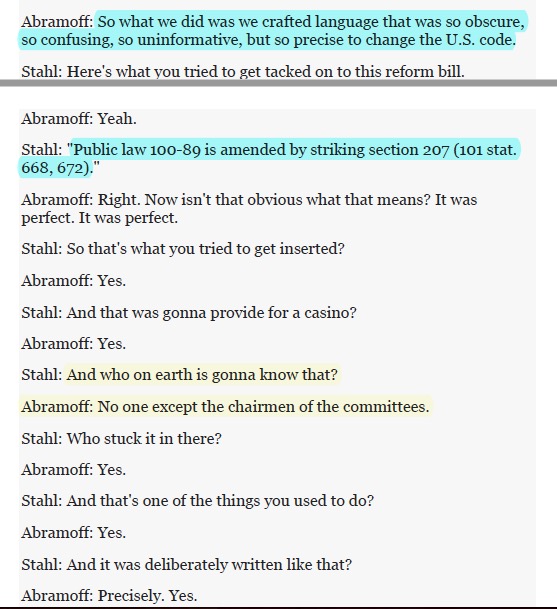
Jack Abramoff on Deceiving Public 2015

Jack Abramoff on Deceiving Public 2015
Nothing strikes the student of public opinion and democracy more forcefully than the paucity of information most people possess about politics. Decades of behavioral research have shown that most people know little about their elected officeholders, less about their opponents, and virtually nothing about the public issues that occupy officials from Washington to city hall.John Ferejohn 1990
Information and the Electoral Process
Even if we assume that political circumstances do actually allow for a politically unconstrained and informed discussion of complex issues, as Arias-Maldonado (2007, p. 248) points out, ‘the belief that citizens in a deliberative context will spontaneously acquire ecological enlightenment, and will push for greener decisions, relies too much on an optimistic, naive view of human nature, so frequently found in utopian political movements’.Mark Beeson 2010
The Coming of Environmental Authoritarianism (Climate)
Most Americans today have only the most general sense of the constitutional role that Congress performs and few citizens have any clear conception of how Congress carries out its legislative responsibilities.Ronald Garay 1984
Congressional Television
[Voter’s] opinions flip depending on how a question is worded: they say that the government spends too much on “welfare” but too little on “assistance to the poor,” and that it should “use military force” but not “go to war.” When they do formulate a preference, they commonly vote for a candidate with the opposite one. But it hardly matters, because once in office politicians vote the positions of their party regardless of the opinions of their constituents. Steven Pinker 2018
Enlightenment Now
That government by initiative is so dysfunctional is no surprise. As the Public Policy Institute for California noted in its October 2012 report “Improving California’s Democracy,” less than 10 percent of all voters polled—Democrats, Republican, and Independents—said that they want the governor and legislature to make the tough choices involved in the state budget, while a full 80 percent said California’s voters should make those decisions through the initiative process. Yet only one in five voters said they know a lot about how state and local governments spend and raise money, and most “cannot name the largest area of state spending (K–14 education) or the largest area of state revenues (personal income taxes).” 64 Direct democracy in California had gone so awry that in 2011 The Economist published a cover story on the initiative process titled “Where It All Went Wrong: A Special Report on California’s Dysfunctional Democracy.”Nathan Gardels & Nicolas Berggruen 2019
Renovating Democracy
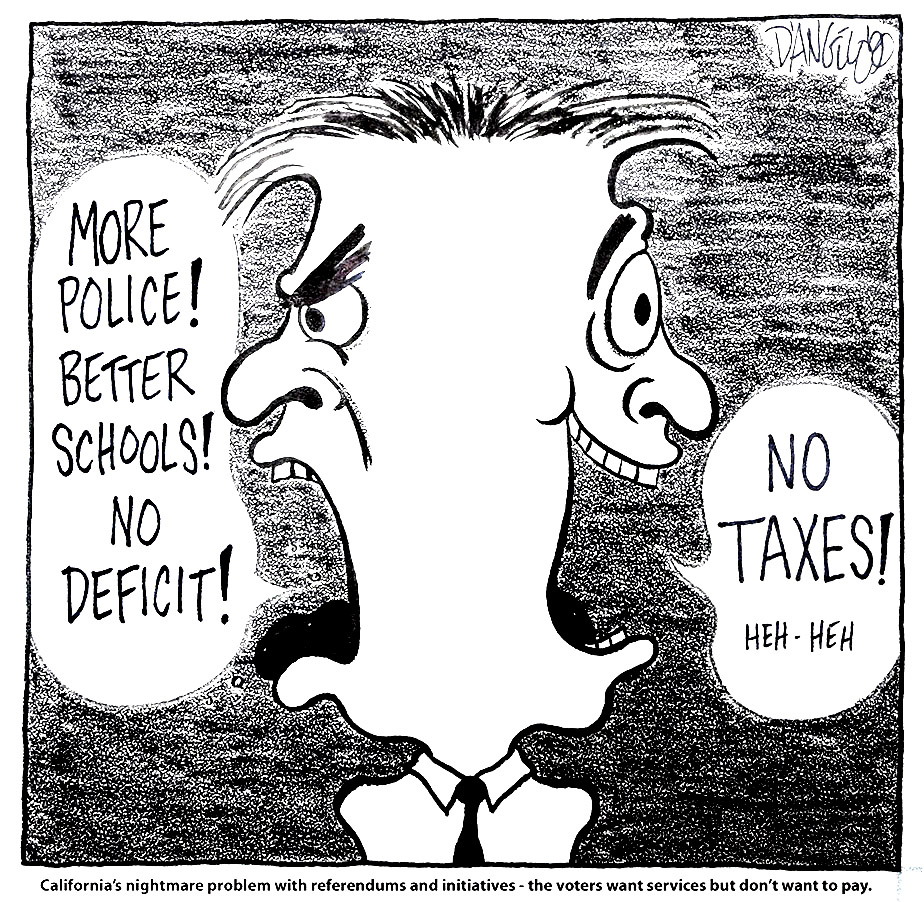
Gus D’Angelo 2011 - Nightmare of Initiatives

Gus D’Angelo 2011 - Nightmare of Initiatives
The second major theoretical claim of Downs is that individual citizens have no incentive even to learn enough to be able to vote their own interests intelligently...this citizen also builds opinions on cavalier ‘facts.’Russell Hardin 2009
How Do You Know?
The questions which really engage the emotions of the masses of the people are of a quite different order. They manifest themselves in the controversies over prohibition, the Ku Klux Klan, Romanism, fundamentalism, immigration. These, rather than the tariff, taxation, credit, and corporate control, are the issues which divide the American people. These are the issues they care about. They are just beneath the surface of political discussion. In theory they are not supposed to be issues. The party platforms and the official pronouncements deal with them obliquely, if at all. But they are the issues men talk about privately, and they are the issues about which people have deep personal feelings. Walter Lippman 1927
The Causes of Political Indifference
Even if voters were smothered with “costless” information, it is doubtful that they would pay attention and process detailed information about the complexities of public policy they do not care much about. In contrast, special interests are “naturally” better informed; compared to the general public, they get costless information as a by-product of their specialized activities, and they have stronger incentives to invest in costly information gathering, to pay costly attention to complex information, and to invest in costly expertise that allows them to understand such information. Susanne Lohmann 1998
Information Rationale For the Power of Special Interests
The truth is that most citizens pay very little attention to politics, and it shows. To call their knowledge of even the most elementary facts about the political system shaky would be generous. To take just a few examples, less than a third of Americans know that a member of the House serves for two years or that a senator serves for six. In 2000, six years after Newt Gingrich became House Speaker, only 55 percent knew the Republicans were the majority party in the House a success rate only a little superior to a random guess. Just two years after he presided over Bill Clinton’s impeachment trial in the Senate, only 11 percent of those surveyed could identify William Rehnquist as chief justice of the United States.
About policy, most voters know even less, and are prone to staggering mistakes. Roughly half of Americans think that foreign aid is one of the two top expenditures in the federal budget (in reality, it consumes about 1 percent of the budget). In 1980, in the midst of the Cold War, 38 percent of Americans surveyed believed that the Soviet Union was a member of NATO the anti-Soviet defense alliance. Two years after the huge 2001 tax cuts, half of Americans were unable to recall that there had been tax cuts at all. Most of the famous “swing voters,” whom journalists tend to idealize as standing above the fray, carefully sorting among the strengths and weaknesses of each party’s offerings, are actually the least engaged, least well-informed citizens, reaching a final decision (if at all) on the flimsiest grounds.Jacob Hacker & Paul Pierson 2010
Winner-Take-All Politics
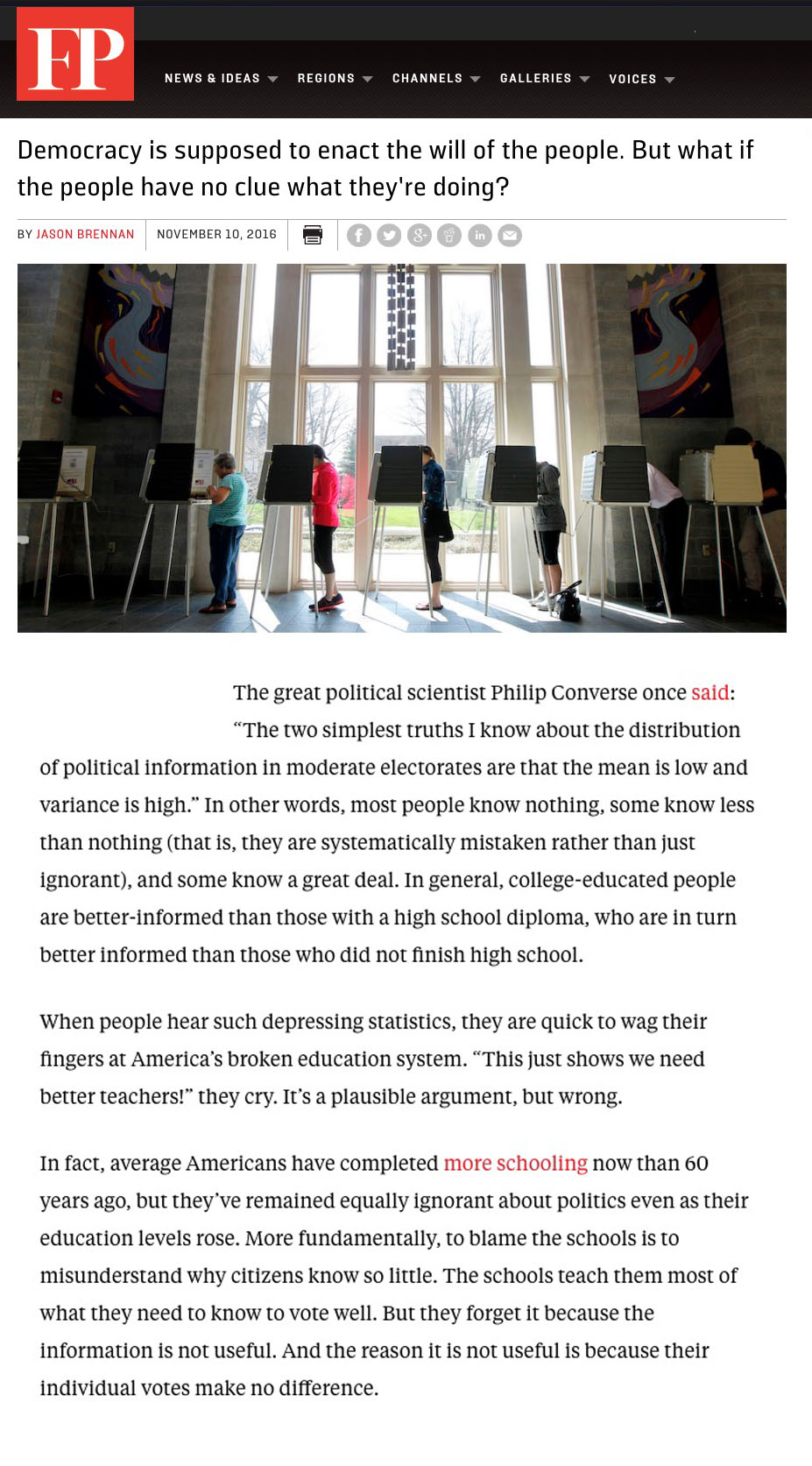
Jason Brennan 2016 - Foreign Policy

Jason Brennan 2016 - Foreign Policy
The reality that most voters are often ignorant of even very basic political information is one of the better-established findings of social science. Decades of accumulated evidence reinforces this conclusion...The evidence shows that political ignorance is extensive and poses a very serious challenge to democratic theory...When President Barack Obama took office in 2009, his administration and the Democratic Congress pursued an ambitious agenda on health care and environmental policy, among other issues. The media covered both issue areas extensively. Yet a September 2009 survey showed that only 37 percent of Americans believed they understood the administration’s health care plan, a figure that likely overestimated the true level of knowledge. A May 2009 poll showed that only 24 percent of Americans realized that the important “cap and trade” initiative then recently passed by the House of Representatives as an effort to combat global warming addressed “environmental issues.” Some 46 percent thought that it was either a “health care reform” or a “regulatory reform for Wall Street.” It is difficult to evaluate a major policy proposal if one does not know what issue it addresses. In 2003, some 70 percent of Americans were unaware of the recent enactment of President George W. Bush’s Medicare prescription drug bill, the biggest new government program in several decades.Ilya Somin 2016
Democracy and Political Ignorance
America’s embarrassing little secret...is that vast numbers of Americans are ignorant, not merely of the specialized details of government which ordinary citizens cannot be expected to master, but of the most elementary political facts – information so basic as to challenge the central tenet of democratic government itself. Paul Blumberg 1990
What Americans Know about Politics
By the mid-1820s, according to historian Ronald P. Formisano, “the vast majority of citizens had lost interest in politics. They had never voted much in presidential elections anyway, and now they involved themselves only sporadically in state and local affairs.”Glenn Altschuler 2001
Rude America - 19th Century Participation
Voting levels in national and state elections in the new republic had, in fact, never been high, not even in the years of greatest partisan contention. Only some sixty-two thousand voters—fewer than a third of those who were eligible—cast ballots for presidential electors in the pivotal election of 1800, and in all the presidential elections before 1828 the turnout of eligible voters never exceeded 42 percent.Glenn Altschuler 2001
Rude America - 19th Century Participation
As Tocqueville remains so important a spokesman for the forcefulness of popular democracy in the Jacksonian era, let us note that the great writer returned to France without having observed a national election, and that in the notes he kept while traveling through America (and while speaking mainly to the most prominent members of American society) is Joel R. Poinsett’s answer to the question,” ‘Does the nomination for President excite real political passion?’ ‘No. It puts the interested parties into a grand commotion. It makes the newspapers make a lot of noise. But the mass of the people remain indifferent.’“ Indifference, too, is the theme of a letter written by Tocqueville’s traveling companion, Gustave de Beaumont, during their American visit. It is a letter that almost directly contradicts his friend’s appraisal of the penetration of politics into daily life. A people with so much free land, wrote Beaumont, “does not feel the slightest disposition to be discontent with the government. Each one, on the contrary, remains indifferent to the administration of the country, to occupy himself only with his own affairs.”Glenn Altschuler 2001
Rude America - 19th Century Participation
[In Greece] negotiations were exposed to the decisions, at once cumbrous and volatile, of a body of citizens, who were extremely ill-informed, subject to gusts of anger, sentimentality, fear or suspicion, inclined at any moment to reverse previous attitudes, and disastrously slow at coming to any decision.Sir Harold Nicolson 1953
The Evolution of Diplomatic Method
Things weren’t perfect in the old days. Hell, in 1952, there were 4 percent of the American people in a Gallup Poll that still thought FDR was president. But I think there was a moderately increased awareness of the basics of governance in those days. People had a little better idea of the Congress and the Supreme Court and the executive branch, and they understood the differences. They don’t anymore, because they’ve been pounded every day by people whose business it is to distort and confuse and to drive home a narrow, substantive viewpoint, rather than educating. So you don’t get Ed Murrow anymore; you get Rush Limbaugh, for Christ’s sake.Rep. Obey 2010
Obey Surveys the House (Politico)
Before assessing the impact of public perceptions of congressional candidates on individual vote choice and on electoral outcomes, I must first document what the public knows about the candidates. Donald Stokes and Warren Miller were impressed with how many voters in 1958 knew nothing at all about the candidates for the House of Representatives. Since the publication of their findings, no evidence has been presented to dispute the accuracy of this conclusion for the 1958 electorate or to support the view that the level of public information about congressional candidates has increased. The burden of proof is clearly on those who would argue that a significant part of the public is aware of the candidates. Mann 1978
Unsafe at Any Margin
Mass public knowledge of congressional candidates declines precipitously once we move beyond simple recognition, generalized feelings and incumbent job ratingsMann 1978
Unsafe at Any Margin
If nobody else cares about it very much, the special interest will get its way. If the public understands the issue at any level, then special interest groups are not able to buy an outcome that the public may not want. But the fact is that the public doesn’t focus on most of the work of the Congress. Most of the work of the Congress is very small things... And all of us, me included, are guilty of this: If the company or interest group is (a) supportive of you, (b) vitally concerned about an issue that, (c) nobody else in your district knows about or ever will know about, then the political calculus is quite simple. Rep. Vin Weber (R-Min) 1995
Speaking Freely (Schram)
Throughout the first 150 years of the federal government, access to government information does not appear to have been a major issue for the federal branches or the public.Austin Sarat 2018
Is full transparency good for democracy?
Transparency is not a viable substitute for regulation. Regulation is needed to ensure that the information disclosed through transparency is accurate and accessible. Moreover, transparency's effectiveness in achieving accountability requires conditions of civic and democratic engagement that do not hold in practice. When there are compelling reasons to advance a particular public good, transparency can help regulation but cannot replace it.Amitai Etzioni 2015
The Limits of Transparency
Citizens are not strongly attached to representative democracy’s processes and norms. Preferences for more participatory opportunities and democratic deliberation are shallow at best. Kathryn VanderMolen 2017
Reconsidering Preferences for Less Visible Government
Much has been written about public alienation from the public affairs process (Berman 1997), and the literature usually assumes that if only the right vehicle for empowerment and engagement were offered, citizens would lose their cynicism toward government and actively support democratic processes. However, theorists need to acknowledge that working out policy decisions and implementation details over a protracted series of meetings is an activity that most citizens prefer to avoid. Where communities are complacent, there is a strong argument for top-down administration simply on the grounds of efficiency. Lawrence and Deagen (2001) allude to this in their study of public participation methods, suggesting that in cases in which the public is likely to accept the mandate of an agency decision maker, a participatory process is not necessary. Williams et al (2001) show that, although members of the public indicated intent to participate, very few (less than 1 percent in their study) followed up by phoning for more information to join a participatory process. Members of the public might prefer to pay taxes to hire an astute public administrator to do the decision making rather than personally allocate the time to get involved in the governing process.Renee Irvin & John Stansbury
Citizen Participation in Decision Making: Is It Worth the Effort?
For obvious defensive reasons, the Continental Congress swore its members to secrecy, and initially none of its proceedings was officially published. These consisted largely of military plans, diplomatic feelers to European powers, and desperate efforts to raise funds. Even under wartime conditions, though, the trend was toward greater publicity... Periodic publication of congressional proceedings was inaugurated in 1777, and weekly publication became the rule in 1779. After 1781, ostensibly due to lack of public interest, the Articles of Confederation required only a monthly publication.Daniel N. Hoffman 1981
Government Secrecy and the Founding Fathers
Politicians often operate according to the self-serving assumption that ordinary citizens must be pacified with malarkey, for they cannot face hard truths. They believe, in the words of H. L. Mencken, that “bosh is the right medicine for boobs” (Mencken 1956, p. 43). This belief, prevalent in political debate and ubiquitous in political practice, is anathema to the Enlightenment’s article of faith. The Enlightenment thus rejects an older view of politics, going back to Plato, according to which government necessarily relies on noble lies - myths or deceptions designed to secure loyalty and love of country. Machiavelli, like Plato (though for rather different reasons), argued that lies and secrecy are essential instruments of successful government. A successful prince, Machiavelli says, must learn how not to be good; he must accept that lies, like betrayal and violence, are necessary tools of government. (A backhanded contemporary acknowledgment of this is an anecdote related by the late Louisiana Senator Russell Long. When Long was in secondary school, he approached his uncle Earl, then the governor of Louisiana, and said that he had been assigned to debate the question of whether one should use truth in politics. What should he say? Earl asked which side Russell had been assigned. When Russell replied that he was to debate the affirmative, Earl thought for a moment, then said, “Hell yes! In politics you use anything you can get your hands on.”)David Luban 1996
Publicity Principle
Evidence from recent presidential campaigns has done little to rehabilitate the American voter’s image. For example, a 1992 report by the Center for the Study of Communication at the University of Massachusetts found that while 86 percent of a random sample of likely voters knew that the Bush’s family dog was named Millie and 89 percent knew that Murphy Brown was the TV character criticized by Dan Quayle, only 15 percent knew that both candidates favored the death penalty and only 5 percent knew that both had proposed cuts in the capital gains tax. There is seemingly no end to the examples one can find to illustrate the public’s ignorance of politics. The single most commonly known fact about George Bush’s opinions while he was president was that he hated broccoli. More people were able to identify Judge Wapner (host of the television series, The People’s Court) than Chief Justices Burger or Rehnquist. More people know John Lennon than Karl Marx, or know Bill Cosby than either of their U.S. senators. More people know who said “What’s Up Doc,” “Hi Yo Silver,” or “Come Up And See Me Sometime” than “Give Liberty or Give Me Death,” “The Only Thing We Have To Fear Is Fear Itself,” or “Speak Softly And Carry A Big Stick.” More people knew that Pete Rose was accused of gambling than could name any of the five U.S. Senators accused of unethical conduct in the savings and loan scandal. And so on. Delli Carpini 2005
What Americans Know about Politics
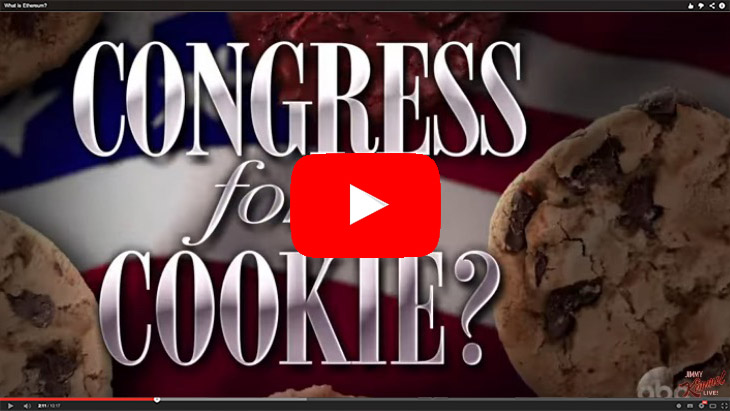
Jimmy Kimmel - Congress for a Cookie 2017

Jimmy Kimmel - Congress for a Cookie 2017
In other words, lawmakers mandating disclosure are grazing a public commons – people’s attention. Each mandate draws a bit of this resource, degrading the others. Lawmakers never consider this when mandating a disclosure, since they are focused on the immediate problem before them. Yet so many law-makers are trying to solve so many problems with disclosure that the already overgrazed commons becomes daily more depleted.We are often asked what should replace mandated disclosure. If mandated disclosure does not work, little is lost in abandoning it. And if mandated disclosure cannot work, the rational response is not to search for another (doomed) panacea, but to bite the bullet and ask which social problems actually need a regulatory response and what response might actually ameliorate the problem.Omri Ben-Shahar & Carl E. Schneider 2014
More Than You Wanted to Know: Failure of Mandated Disclosure
Two experts in public opinion and political behavior find that many citizens are remarkably informed about the details of politics, while equally large numbers are nearly ignorant of political facts. And despite dramatic changes in American society and politics, citizens appear no more or less informed today than half a century ago. Michael X. The authors demonstrate that informed persons are more likely to participate, better able to discern their own interests, and more likely to advocate those interests through political actions. Who, then, is politically informed? The authors provide compelling evidence that whites, men, and older, financially secure citizens have substantially more knowledge about national politics than do blacks, women, young adults, and financially less-well-off citizens. Thus citizens who are most disadvantaged socially and economically are least able to redress their grievances politically.Delli Carpini & Scott Keeter 1996
What Americans Know about Politics
Only 13 percent of the more than 2,000 political questions examined could be answered correctly by 75 percent or more of those asked, and only 41 percent could be answered by more than half the public. Many of the facts known by relatively small percentages of the public seem critical to understanding—let alone effectively acting in—the political world: fundamental rules of the game; classic civil liberties; key concepts of political economy; the names of key representatives; many important policy positions of presidential candidates or the political parties; basic social indicators and significant public policies.Delli Carpini & Scott Keeter 1996
What Americans Know about Politics
Then there are countless programs that are not secret but that are too complicated and numerous for the public to pay attention to – from E.P.A. regulation to quantitative easing… This puts even more pressure on the first prong of the paradox. If much (most?) of government activity remains invisible to the public, how can democratic accountability work? The answer, I think, is that political accountability in modern, large-scale democracies rarely takes place through informed public monitoring of specific government programs and policies. A few discrete issues (abort ion, same-sex marriage) aside, and not counting political scandals, the public largely votes on the basis of its pocketbook and its feeling of security.Eric Posner 2013
The Secrecy Paradox
[The people] know nothing about government or current events. They can’t follow arguments of any complexity. They stuff themselves with slogans and advertisements. They eschew fact for myth. They operate from biases and stereotypes, and they privilege feeling over thinking. The result is a political system of daunting irrationality... A study finds that 22 percent of Americans can name all five members of TV’s “Simpsons” clan, but only one in 1,000 can name all five First Amendment freedoms.Louis Bayard 2008
Are you too dumb to vote?
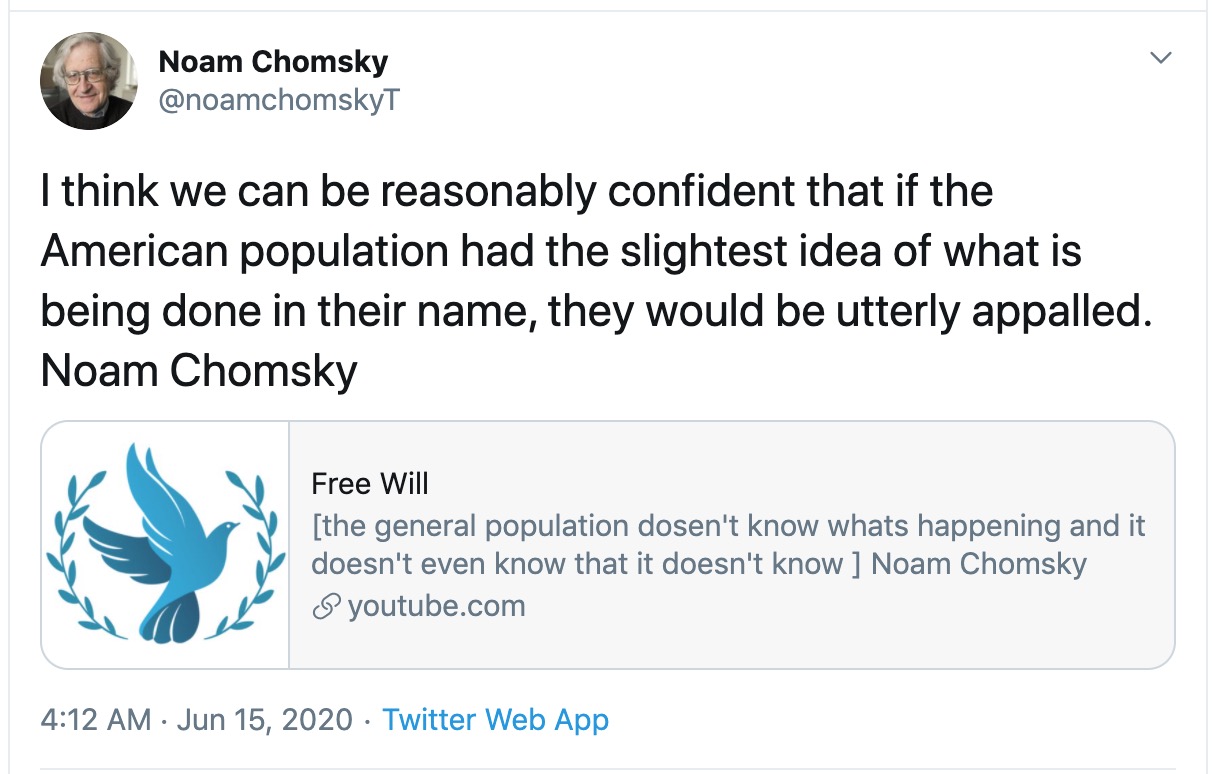
Noam Chomsky 2020 - Americans don’t know

Noam Chomsky 2020 - Americans don’t know
The fact is, that the public have an insatiable curiosity to know everything, except what is worth knowing.Oscar Wilde 1891
The Soul of Man Under Socialism
Stokes and Miller pointed out some years ago that "the popular image of the Congressman is almost barren of policy content. A long series of open-ended questions asked of those who said they had any information about the Representative produced mainly a collection of diffuse evaluative judgments: he is a good man; he is experienced; he knows the problems; he has done a good job; and the like."...half of the comments referred to his personal qualities.Thomas Mann 1978
Unsafe at Any Margin
How little solidity and substance there is in the political or social beliefs of nineteen persons out of every twenty. These beliefs, when examined, mostly resolve themselves into two or three prejudices and aversions, two or three prepossessions for a particular leader or party or section of a party, two or three phrases or catchwords suggesting or embodying arguments which the man who repeats them has not analyzed.James Bryce 1894
The American Commonwealth
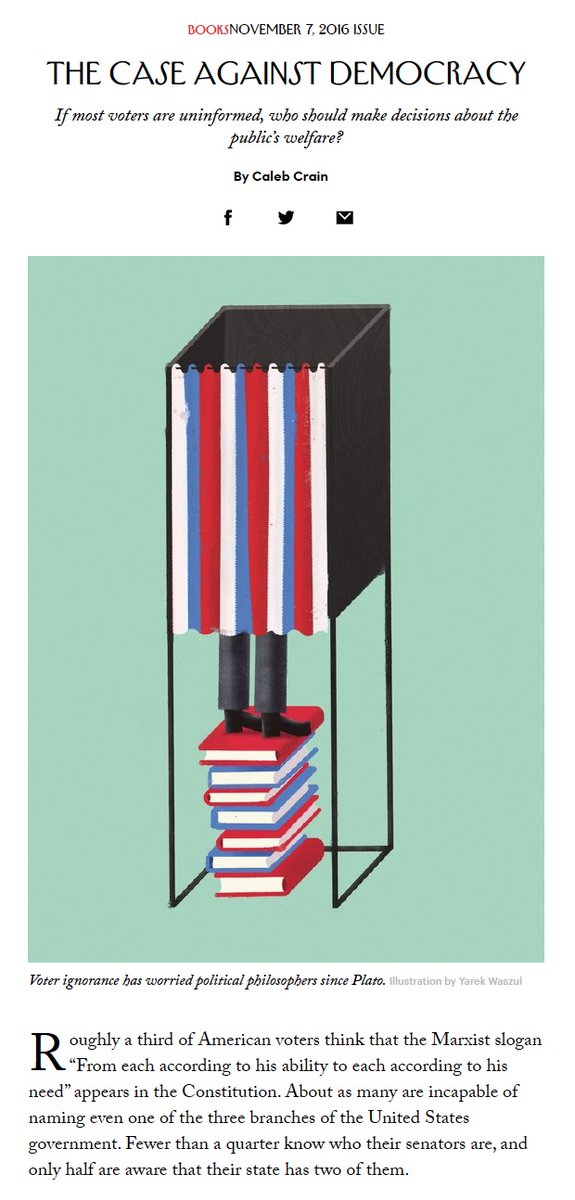
Caleb Crain 2016 - New Yorker

Caleb Crain 2016 - New Yorker
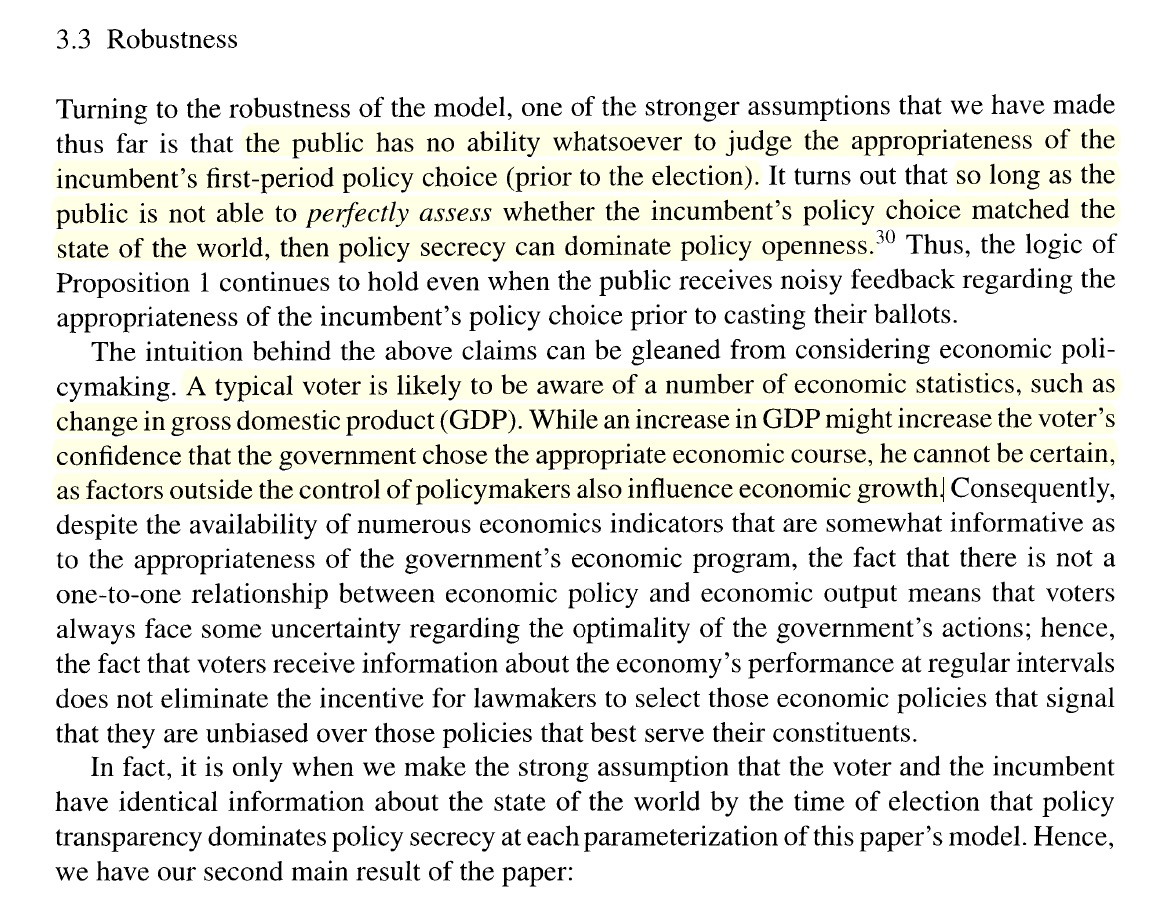
Justin Fox 2006 - Government Transparency and Policymaking

Justin Fox 2006 - Government Transparency and Policymaking
The public has no ability whatsoever to judge the appropriateness of the incumbent’s first-period policy choice (prior to the election). It turns out that so long as the public is not able to perfectly assess whether the incumbent's policy choice matched the state of the world, then policy secrecy can dominate policy openness.Justin Fox 2006
Government Transparency and Policymaking
On February 20, 1794, by a 19-8 vote on a new resolution, the Senate voted to open its doors, but two years would pass before permanent galleries were constructed. The addition of public galleries had little effect on the Senate; most sessions were sparsely attended. There was little upsurge in either public favor or public derision.Stephen Frantzich & John Sullivan 1996
The C-SPAN Revolution
The results suggest that most voters do not know what they need to know in order to vote retrospectively...a substantial portion of voters do not possess the knowledge assumed by theories of economic voting. This is true even in the case of Finland, which has high civic literacy and a highly educated public. Only 38% could name all four parties in the government coalition, without also incorrectly naming any additional parties...The implications for government accountability are discussed.Lauri Rapeli 2016
Who to punish? Retrospective voting
Members can explain yes votes on restrictive rules in a myriad of ways, which either appeases or confuses the vast majority of constituents.David Rohde 2012
Party and Procedure in the United States Congress
Lessig worries that more information disclosure can have the pernicious unintended consequence of making market actors believe that they don't have to worry about particular problems because they have been disclosed. Yet, more of a data dump doesn't mean that the data will be processed and acted upon correctly. In fact, more data dumps – especially in areas like corporate governance that aren't well-understood – probably make it less likely that bad behavior will be singled out than many would assume.Eric Jackson 2009
Critique of Transparency
Has television coverage of Congress increased public understanding of the issues and operations of Congress and, as a result, increased public confidence and trust in the institution? There is no hard evidence chat it has. However, 65 percent of the respondents to a 1995 poll said they received most of their news about Congress from local or network television newscasts, compared with 20 percent from newspapers. And according to another poll, network news coverage of Congress has been steadily declining rather than increasing since the advent of televised floor sessions. Therefore, it is highly unlikely chat more Americans are better informed about Congress and its debates than they were during the pre-TV era. The exception, of course, are regular C-SPAN viewers, but they comprise only a small fraction of the TV-viewing public. Whereas 62 percent of the people in a Roper Poll said they watched a TV news program daily, only 4 percent said they watched C-SPAN daily. Donald Wolfensberger 2000
Congress and the People
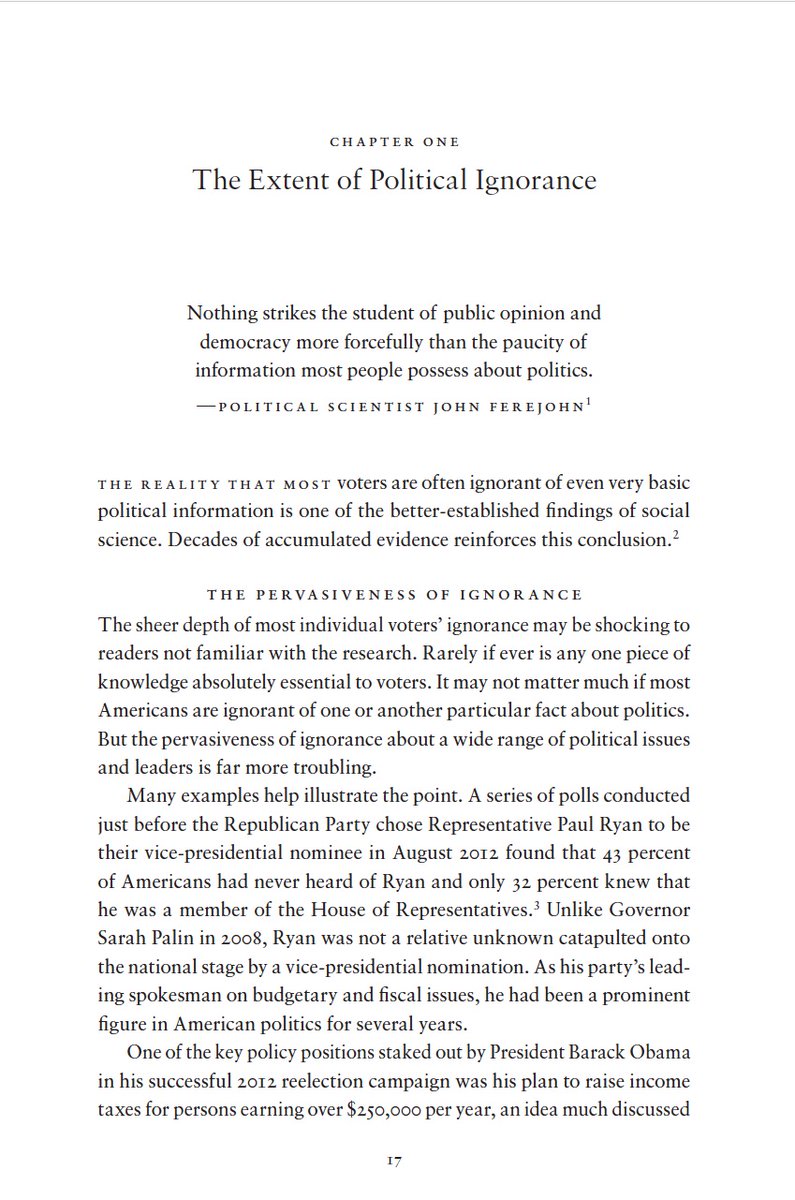
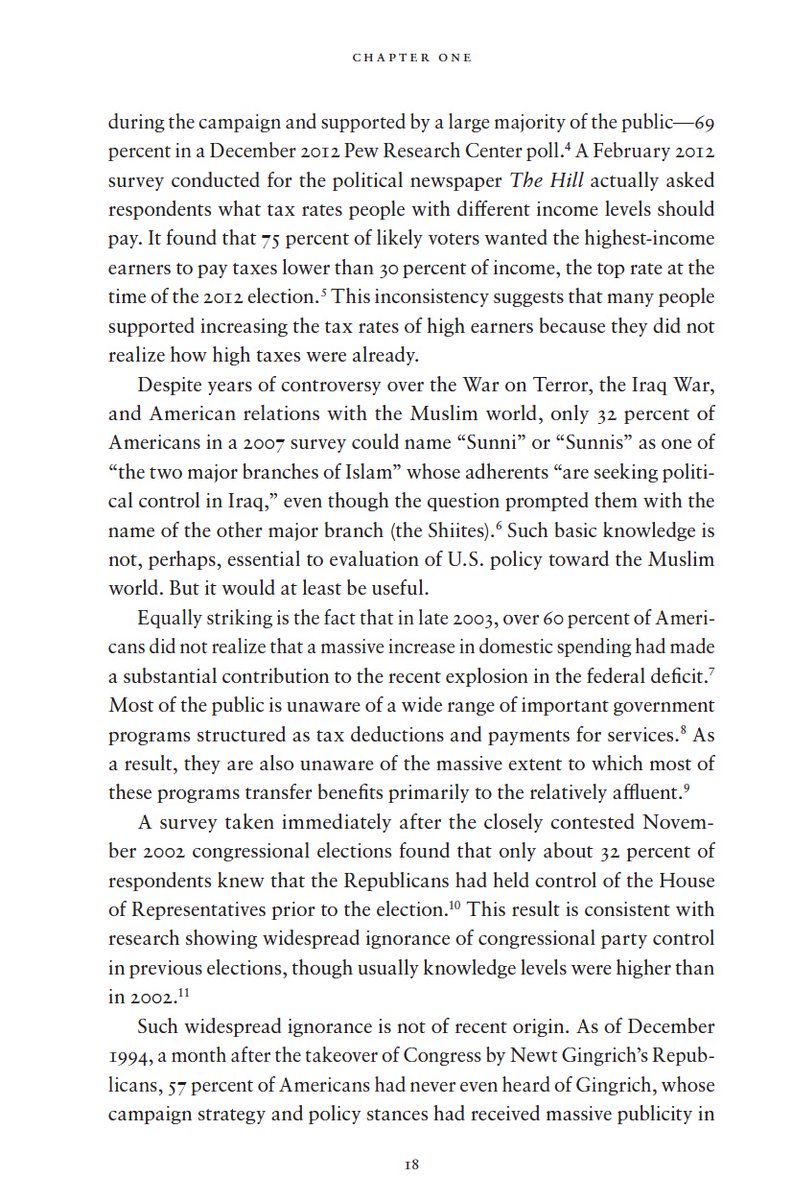
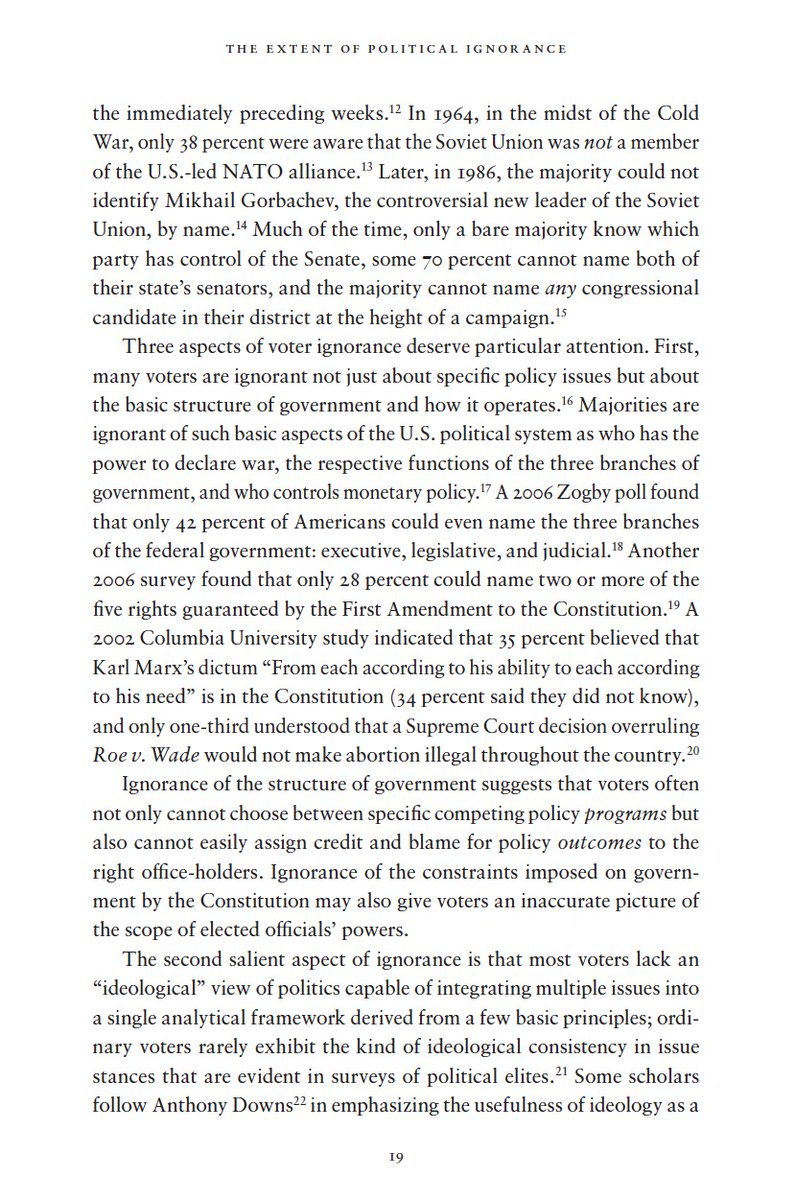
Ilya Somin 2012 - Democracy & Political Ignorance - p17-19

Ilya Somin 2012 - Democracy & Political Ignorance - p17-19
The errors of public opinion in these matters have a common characteristic. The movement of opinion is slower than the movement of events. Because of that, the cycle of subjective sentiments on war and peace is usually out of gear with the cycle of objective developments. Just because they are mass opinions there is an inertia in them. It takes much longer to change many minds than to change a few. It takes time to inform and to persuade and to arouse large scattered varied multitudes of persons. So before the multitude have caught up with the old events there are likely to be new ones coming up over the horizon with which the government should be preparing to deal. But the majority will be more aware of what they have just caught up with near at hand than with what is still distant and in the future. For these reasons the propensity to say “No” to a change of course sets up a compulsion to make mistakes. The opinion deals with a situation which no longer exists.Walter Lippman 1955
Essays in Public Philosophy
In his seminal paper “The Nature of Belief Systems in Mass Publics,” Philip Converse paints a bleak picture of the American public as largely lacking coherent political preferences. Converse observed that survey respondents are apt to express different preferences when presented with the identical question on different occasions, that preferences on one policy issue are at best weakly associated with preferences on seemingly related issues, and that most Americans poorly understand broad organizing principles like liberalism or conservatism. Confronted with this evidence, Converse concludes that the preferences respondents report on surveys consist largely of “non-attitudes” and that “large portions of [the] electorate do not have meaningful beliefs, even on issues that have formed the basis for intense political controversy among elites for substantial periods of time.”Martin Gilens 2012
Affluence and Influence
In short, even the least demanding conceptions of democracy require citizens to form preferences and to make difficult assessments of the responsibility of political leaders. But are citizens capable of fulfilling even this least demanding understanding of their role in democratic governance? Skeptics of democracy since Plato have held that ordinary citizens are ill-equipped to guide government decision making, and a half-century of survey data on political knowledge lends credence to this skepticism.Martin Gilens 2012
Affluence and Influence
There is clearly a good deal of ignorance in the public’s knowledge about candidates for congressional office. For example, when people were asked, “Do you happen to remember anything special that your U.S. Representative (name supplied) has done for this district or for the people in this district while (he or she) has been in Congress?” 80 percent of a national sample and 69 percent of those who had voted that year (1978) said they did not. This occurs despite the fact that representatives devote considerable resources to mailings and visits home in order to describe what they have done for their constituents. Only 29 percent of the respondents in the same survey could identify an issue of at least some importance to them from the most recent congressional campaign, and less than 10 percent could remember any bill on which their representative had voted.David Vogler & Sidney Waldman 1985
Congress and Democracy
A 1972 study showed that, while people could describe their own positions and those of both parties and both presidential candidates on questions of welfare and Vietnam, and could rate themselves, the parties, and the candidates on a liberalism-conservatism scale, a clear majority of respondents could not do the same for their congressional candidates. This was true even for those who considered Vietnam and welfare to be the most important problems facing the national government and even when they were told the party of the candidates.David Vogler & Sidney Waldman 1985
Congress and Democracy
There is another, more subtle, consequence of [voter] ignorance. The voting public tends to focus on the president, a pattern reinforced by the media, and often holds him responsible for failures and successes on economic and other issues before it holds members of Congress responsible. Since Congress does have a major role in domestic policy, this is an important bias in public perception. As just noted. Congress as a whole is held in low esteem, yet most incumbents are reelected. Citizens apparently think the problems with Congress are due to representatives from districts other than their own, and members are apt to reinforce such views. This puts the public in a curious position when a president is unable to get congressional approval of programs central to the presidential campaign. The voters blame and sometimes reject a president they have chosen, because he was not “successful,” while returning to office the members of Congress responsible for his failures. David Vogler & Sidney Waldman 1985
Congress and Democracy
Voters cannot hold legislators responsible without sufficient information about what legislators have, in fact, done. Yet that sort of information consistently eludes the electorate. It is an article of faith among political scientists that citizens are woefully uninformed about politics.Jane Schacter 2006
Political Accountability
Ordinary citizens do not and cannot hope to match the capabilities of organized interests.Frances Lee (Princeton) 2019
Select Committee on the Modernization of Congress
In sum, while congressional activity is certainly more accessible to citizens, the fragmentary evidence accumulated in the short time the sunshine reforms have been in effect suggests that the public is not really more aware of, or more sympathetic to, Congress or its members, their activities, or their performance. Citizens seem no better able to recall the incumbent’s name, though more can recognize it when it is presented to them; there has been no visible increase in issue-based voting in congressional elections. Incumbency and partisanship more than policy positions shape voter concerns.Larry Rieselbach 1982
Reforming Congressional Procedures
Visible legislative operations, for example, have had repercussions that some observers find disturbing. For one thing, there is little if any persuasive evidence that citizens, in fact, do pay greater attention to Congress... The observer, more likely a group than a citizen, has greater influence in the more public setting of contemporary congressional politics.Joseph Bessette 1982
Is Congress A Deliberative Body?
People would actually prefer a less visible, “stealth” form of government that makes little noise. It has been recognized, for instance, that hierarchic institutions such as the military, the police, organized religion, and the Supreme Court gather the most public support due to their ability to hide conflict. Stealth democracy operates similarly in that it efficiently and objectively makes decisions without [observable] disagreement. Kathryn VanderMolen 2017
Stealth Democracy Revisited
Citizens can find out who bankrolls the elected representatives and how those legislators vote, but the evidence, on balance, suggests that few engage in the complicated investigation and analysis necessary to hold their lawmakers to strict account.Larry Rieselbach 1994
Congressional Reform
Members of Congress, as individuals, have little incentive to respond to general interests, but have compelling reasons to service organized groups. The electorate rarely knows how members vote and does not hold individual legislators responsible for national conditions. Organized interest groups do monitor the members' activity, and they reward dedicated service with campaign contributions and other support.Paul Quirk 1991
Evaluating Congressional Reform
The day-to-day of the lobbyist is really not all that glamorous. It is staying up on the very latest news, knowing what’s moving, what isn’t, why, and what to do about it... This banality of lobbying may be precisely the reason that lobbying is influential. The devil lies in the details, and only those with the resources and patience to painstakingly master the most abstruse intricacies, to cover all angles and shore up all the bases, will win.Lee Drutman 2010
Ph.D Dissertation on Lobbying
*NOTE: Note how Drutman makes it clear that those who will win have the resources, time and patience to follow every legislative detail...which is definitely not the citizens.
I have challenged the conventional accountability axiom, arguing that it has two characteristic sorts of problems. The first is a deficit in accountability that arises because voters are so poorly informed about politics and legislation.Jane S. Schacter 2006
Political Accountability
Special interests prevail because they are better able to monitor the incumbent’s activities than are diffuse interests. For example, farm households in developed countries are generally well informed about legislation dealing with agricultural price supports and subsidies, and they can assess fairly accurately whether and how their political representatives contributed to the passage of an agricultural bill or to the size of price supports and subsidies the bill promises to deliver. In contrast, the huge majority of non-farm households is unlikely to know that an agricultural bill was passed at all, let alone its details or the contributions made by their political representatives. Members of the general public may well notice the decrease in their real disposable income caused by the increase in food prices and taxes, but they can assign political blame for the loss only very imprecisely... Either way, organized interests end up with access to better, or less costly, observations of political performance than do unorganized voters.Susanne Lohmann 1998
Information Rationale for the Power of Special Interests
In its comprehensive study of voter involvement in the 2000 election, Harvard’s Shorenstein Center quizzed a random sample on their knowledge of the issues just before they went to the polls: “[We] asked respondents to agree or disagree with twelve issue statements—six that addressed Gore’s positions and six that concerned Bush’s. On the average issue, 38 percent correctly identified the candidate’s position, 16 percent incorrectly identified it (an indicator that a third or more of the correct answers were also mere guesses), and 46 percent said they did not know.” A majority was able to identify only one of each candidate’s stands correctly—with 58 percent saying that Gore favored a prescription drug benefit and 52 percent saying that Bush favored “a large cut in income taxes” (and some of these people were only guessing). These dismal results are not restricted to the United States. To take just one example, when the British public was recently asked whether Britain had a written or an unwritten Constitution, a quarter said “unwritten,” a quarter said “written,” and half said “don’t know.”Bruce Ackerman & James Fishkin 2004
Deliberation Day
Most people, most of the time, are able to find better things to do than participate in politics. Even if some method could be devised to allow all citizens to be consulted on every governmental decision, few people would have the time or inclination to participate. Study and informed debate are required to decide whether the tax code should be amended to allow machines used in manufacturing glass containers to be depreciated on an accelerated schedule, or whether a program is required to subsidize students taking graduate degrees in mining engineering. Yet those are the kind of narrow, technical questions that elected legislators must deal with every day. They manage to address these questions through an elaborate system of specialized committees and with the assistance of thousands of staff members. Most citizens would not be able to comprehend the information generated by the congressional staff, and even if they could, there is little reason to think it would interest them. People have better things to do. Legislating in a modern democracy has become a highly specialized, full-time job. Most people do not know how their representative votes on most issues that come before Congress. The little they hear in the mass media about new legislation is usually obscured by confusing talk of conference committees, parliamentary maneuvers, floor votes, presidential vetoes, or administrative rulings…the majority of citizens never have any direct contact with their representatives and know nothing about them.Jack Walker & David King 1998
Mobilizing Interest Groups in America
Most legislators voting on any given issue would not have a constituency interest involved. Most Representatives do not have a large proportion of their electors who are farmers, union members, or businessmen. Rarely was there a constituency interest or attitude, which was so strong that the Representative had to bow before it; indeed, Miller and Stokes found a close fit between constituency opinion and the Representative’s voting record only on civil-rights issues.Graham K. Wilson 1981
Interest Groups in the United States
Even if legislative processes are open, does the public actually tune in to them? One cannot be a romantic about this. It would be an economically unproductive and no doubt crazed public that spent all its days watching C-SPAN. But one does get the sense that Congress’s place in American public life may be slipping. The public is much distracted. There is too much otherwise to do, watch, and listen to. Law and Order reruns and other attractions are stiff competition. An attribute of the public itself may be at issue here, but visibility is also an attribute of Congress.David Mayhew 2006
Promoting the General Welfare
What is striking is that political scientists have done so little to investigate empirically the electoral consequences of voter ignorance. If those who have viewed a well-informed electorate as crucial to the functioning of democracy have been too little burdened by the scientific demand for supporting evidence, the same could be said of those who have viewed the political ignorance of the average voter as largely or wholly irrelevant. They have preferred either to limit their analyses to individual information stores and information processing, or to extrapolate from individuals to collective outcomes on the basis of assumptions rather than evidence.Larry Bartels 1996
Uninformed Votes
[The] evidence demonstrates that the great majority of citizens pay little attention to politics. At election time, they are swayed by how they feel about “the nature of the times,” especially the current state of the economy, and by political loyalties typically acquired in childhood. Those loyalties, not the facts of political life and government policy, are the primary drivers of political behavior. Election outcomes turn out to be largely random events from the viewpoint of contemporary democratic theory.Christopher Achen & Larry Bartels 2016
Democracy for Realists
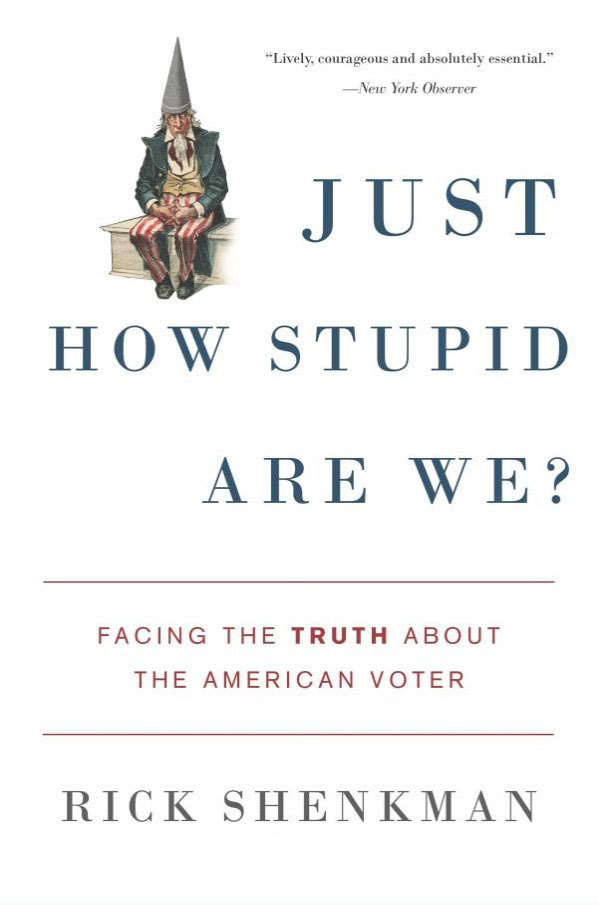
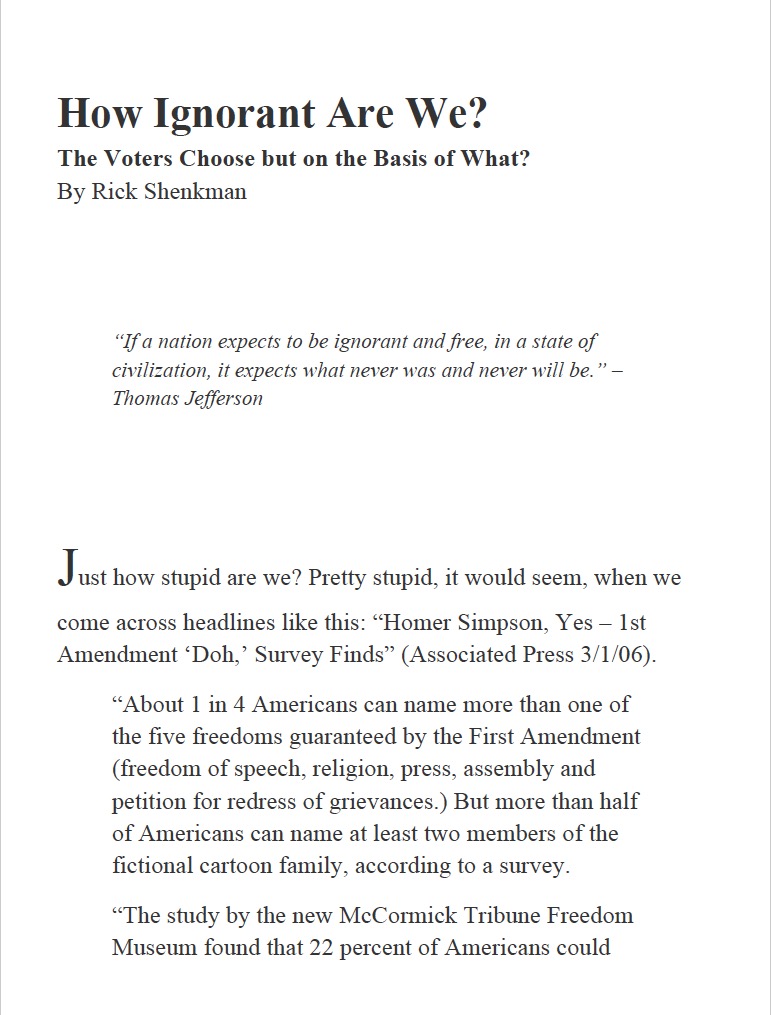
Rick Shenkman 2008 - How Stupid Are We? (pdf)

Rick Shenkman 2008 - How Stupid Are We? (pdf)
When social scientists first started using detailed opinion surveys to study the attitudes and behavior of ordinary voters, they found some pretty sobering things. In the early 1950s, Paul Lazarsfeld and his colleagues at Columbia University concluded that electoral choices “are relatively invulnerable to direct argumentation” and “characterized more by faith than by conviction and by wishful expectation rather than careful prediction of consequences.” For example, voters consistently misperceived where candidates stood on the important issues of the day, seeing their favorite candidates’ stands as closer to their own and opposing candidates’ stands as more dissimilar than they actually were. They likewise exaggerated the extent of support for their favorite candidates among members of social groups they felt close to.In 1960, a team of researchers from the University of Michigan published an even more influential study, The American Voter. They described “the general impoverishment of political thought in a large proportion of the electorate,” noting that “many people know the existence of few if any of the major issues of policy.” Shifts in election outcomes, they concluded, were largely attributable to defections from long-standing partisan loyalties by relatively unsophisticated voters with little grasp of issues or ideology. A recent replication of their work using surveys from 2000 and 2004 found that things haven’t changed much in the past half-century.The intervening decades have seen a variety of concerted attempts to overturn or evade the findings of the classic Columbia and Michigan studies. In the 1970s, for instance, some scholars claimed to have discovered what the title of one prominent book called The Changing American Voter, a much more issue-oriented and ideologically consistent specimen than the earlier studies had portrayed. Unfortunately, further scrutiny revealed that most of the apparent improvement could be attributed to changes in the questions voters were being asked rather than a remarkable elevation of their political thinking. When voters were asked the old questions in the 1970s, their responses displayed no more consistency or sophistication than the responses from the 1950s described by the authors of The American Voter.In the 1990s political scientists took a different tack, acknowledging that voters were generally inattentive and uninformed but denying that the quality of their political decisions suffered much as a result.Larry Bartels 2008
The Irrational Electorate
Americans are indifferent to much that transpires in the political world, hazy about many of the principal players, lackadaisical regarding debates on policies that preoccupy Washington, ignorant of facts that experts take for granted, and unsure about the policies advanced by the candidates for the highest public offices.Kinder & Sears
Public Opinion and Political Action
But in the real world of American politics, interested individuals and organizations, not average citizens, have the greater incentive and means to monitor the government closely. This can open the door to obstruction and policy distortion as it enables regulatory capture by interested parties who advocate freely for their views without any countervailing public voice.Bruce Cain 2014
The Transparency Paradox
Given the technical nature of regulations and permits, Federal agencies and advisory committees rarely hear from average citizens. More often, stakeholders with strong material interests and preferences dominate the public hearings and opportunities for
ex parte discussions with agency officials. Consequently, there is no guarantee that these agencies and committees will receive balanced information reflecting broader public interests.Bruce Cain 2014
The Transparency Paradox
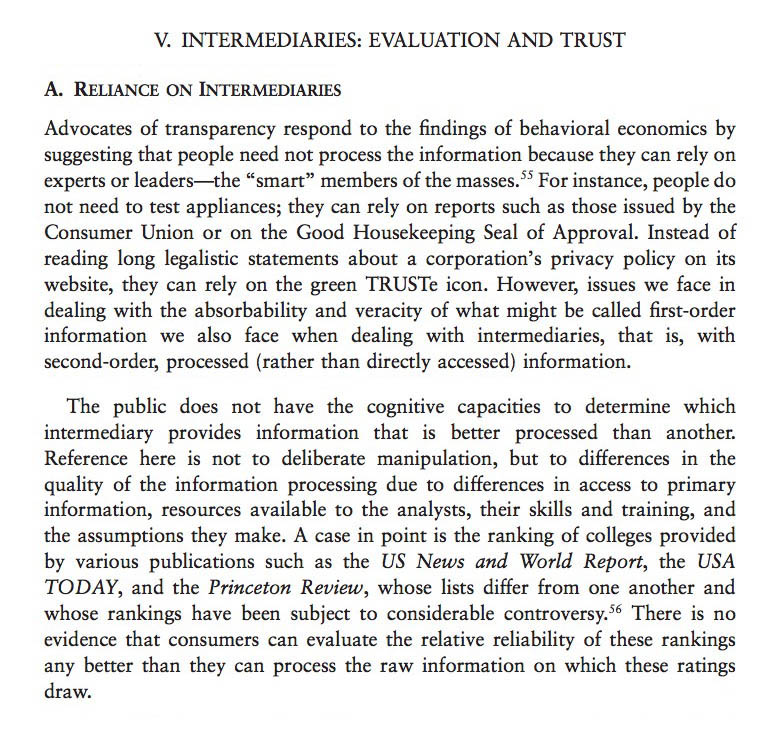
Etzioni 2014 – Is Transparency the Best Disinfectant?
*NOTE: What Etzioni is underlying here, rather beautifully, is that when the public do not monitor and follow legislation, they cannot then turn to civic groups to do so either as the citizens will run into the same trust/accountability problems with the civic groups that they originally had with their legislators.

Etzioni 2014 – Is Transparency the Best Disinfectant?
The democratic citizen is expected to be well informed about political affairs. He is supposed to know what the issues are, what their history is, what the relevant facts are, what alternatives are proposed, what the party stands for, what the likely consequences are. By such standards the voter falls short. Even when he has the motivation, he finds it difficult to make decisions on the basis of full information when the subject is relatively simple and proximate; how can he do so when it is coniplex and remote?Berelson, Lazarsfeld & McPhee 1954
Democratic Practice and Democratic Theory
Many people know the existence of few if any of the major issues of policy.Campbell et al. 1960
Government Spending
Since there are so many issues being addressed in the political arena, creating a policy space for each of them quickly leads to overload for both the respondents and the analysts.John Hibbing & Elizabeth Theiss-Morse 2004
Stealth Democracy
People who participate regularly and knowledgeably form a distinct minority.Entman – 1989 Democracy Without Citizens
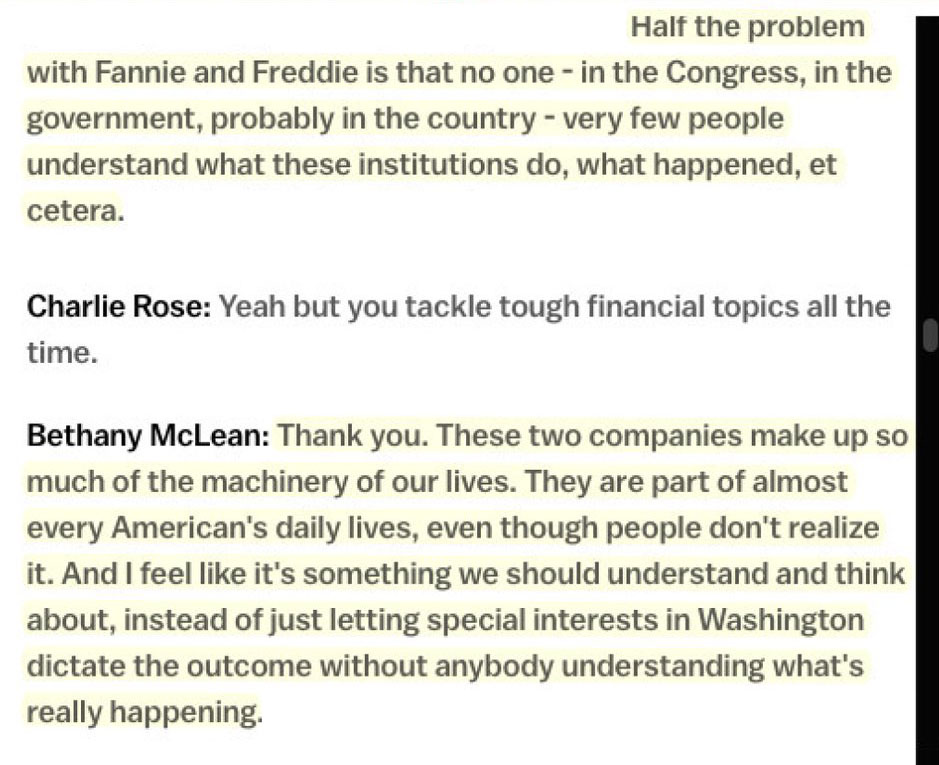
Charlie Rose Show (video)

Charlie Rose Show (video)
Transparency theory presumes, in the first instance, the existence of an interested public that needs and wants to be fully informed. This presumption badly needs proof. A vast body of empirical studies demonstrates citizens' lack of political knowledge. Summarizing the extent of voter ignorance, one commentator has concluded that “voters are not just ignorant about specific policy issues, but about the basic structure of government,” lack ideological consistency in issue stances, and have been found to be consistently ignorant about politics by survey research into the matter since the late 1930s.Mark Fenster 2006
The Opacity of Transparency
Other data…strongly indicate that people are neither as able to process information nor as likely to act on it as transparency theory presumes…The state’s large bureaucracies…make a staggering number of decisions of varying importance, not all of which can be viewed before the fact or even easily reviewed later. The state is too big, too remote, and too enclosed to be completely visible. Mark Fenster 2017
The Transparency Fix
Ordinary citizens tend to pay attention to politics only fitfully, and possess in consequence a thin, rather than thick, knowledge of it.Paul M. Sniderman 1993
The New Look in Public Opinion Research
The evils we experience flow from the excess of democracy. The people do not want virtue, but are the dupes of pretended patriots. In Massts. it had been fully confirmed by experience that they are daily misled into the most baneful measures and opinions by the false reports circulated by designing men, and which no one on the spot can refute.Rep Elbridge Gerry 1787
Constitutional Convention
“I have to vote on 150 different kinds of things every year – foreign aid, science, space, technical problems, and the Merchant Marine, and Lord knows what else. I can’t possibly become an expert in all of these fields.”Member of Congress 1975
Yeas and Nays - Cue Taking & Decision-Making
*NOTE: Here authors Donald Matthews and James Stimson quote a member of Congress talking about how it is impossible to follow all the legislation, and that’s his full time job.
On the day the House passed HR6678 [a bill on bank holding companies], members also discussed on the floor (in one form or another) national egg inspection, aircraft cost overruns, school desegregation, the war in Vietnam, defense appropriations, food stamps, office equipment for members of the House, the poverty program, draft reform, the problems of air travel and the Supersonic Transport, crime, education problems in the District of Colombia, consumer protection, and rural electrification. Each member might consider themselves an expert on only one or two of these issues, and they are thus completely overwhelmed on the others. A member of the Armed Services Committee commented “Now the years that I studied military things, it would take a man that many years to learn it. And you don’t have enough hours, enough years in your life to learn all you should.Donald Matthews & James Stimson 1975
Yeas and Nays - Cue Taking & Decision-Making
*NOTE: Here Matthews and Stimson discuss how difficult it is for a member of Congress to follow all the legislation, and that’s their full time job.
We don't have a problem with information — we have an information overload.Lorelei Kelly 2012
Washington Post
Full rationality requires unlimited cognitive capabilities. Fully rational man is a mythical hero who knows the solutions to all mathematical problems and can immediately perform all computations, regardless of how difficult they are. Human beings are in reality very different. Their cognitive capabilities are quite limited. Modern mainstream economic theory is largely based on an unrealistic picture of human decision making. Economic agents are portrayed as fully rational Bayesian maximizers of subjective utility… However, it is wrong to assume that human beings conform to this ideal. Selten 1999
Bounded Rationality
In a complex and uncertain world, humans and animals make decisions under the constraints of limited knowledge, resources, and time. Yet models of rational decision making in economics, cognitive science, biology, and other fields largely ignore these real constraints and instead assume agents with perfect information and unlimited time.2002 Gerd Gigerenzer
Bounded Rationality
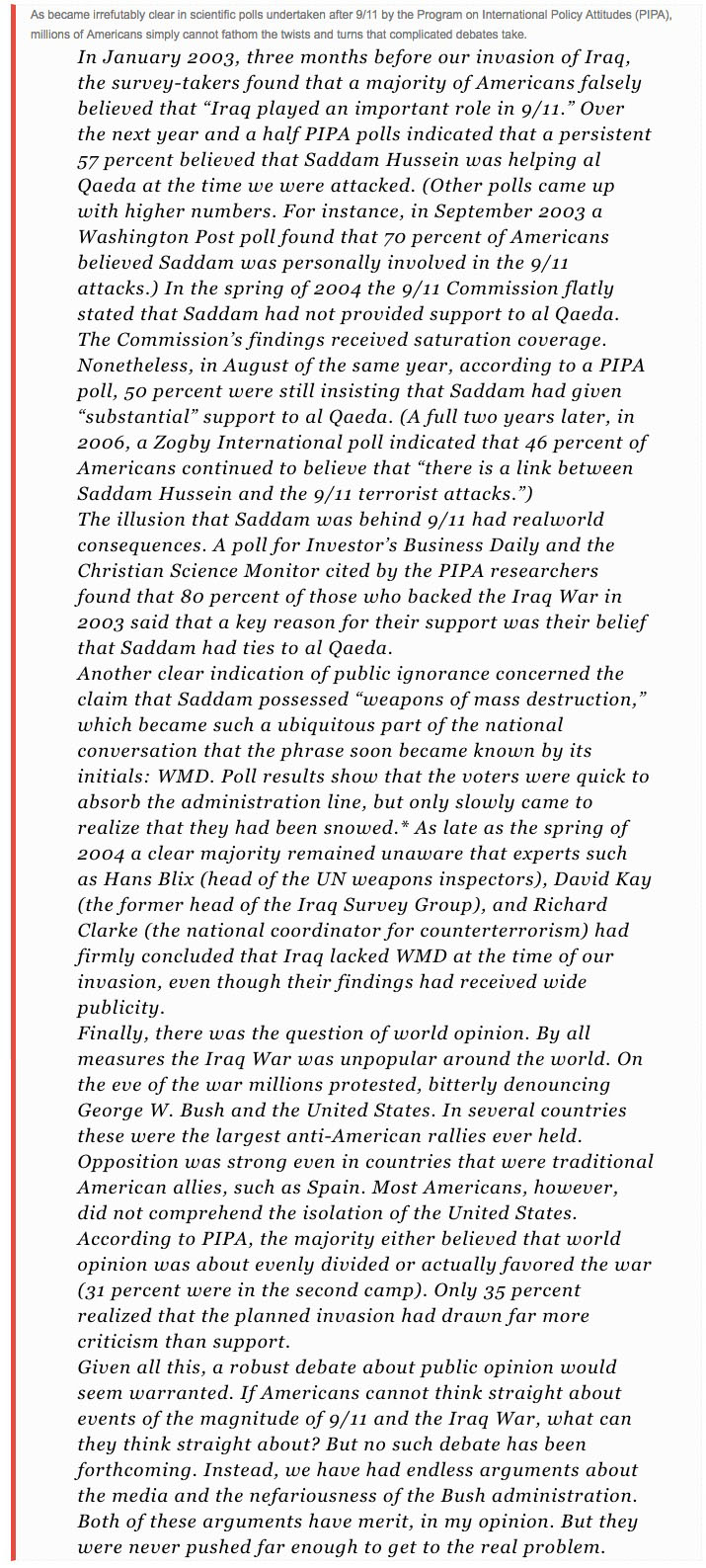
Program on Political Policy Attitudes

Program on Political Policy Attitudes
Approximately 20 percent of Americans recognize basic terms such as Bill of Rights, three branches of government, and only 10 percent of American voters could give an acceptable definition to liberalism and conservatism (Neuman 1986, pp. 17, 19) Most voters do not even know with whom their country is at war. According to a 2007 survey, despite the Iraq war since 2003, only one third of Americans knew that “Sunni” or “Sunnis” are one of the two major Islamic groups that were trying to control Iraq. In other words, two thirds of Americans could not name “Sunni” even though the survey had already mentioned the name of the other branch of Islam, the Shiites, in the question (Somin 2016, 18). After more than two decades, political knowledge of an average American voter has not increased on these basic issues (see Hentoff 2011), and still political ignorance, as Neuman pointed out, “is a cause for profound concern” (1986, 8). As Scott Althaus writes “if ignorance is bliss, then the pursuit of happiness seems alive and well in American society” (2003, 12).Ilkin Huseynli 2017
Importance of Voter Competence in Democracy
Perhaps the more difficult problem is simply a lack of interest. Many voters do not choose to avail themselves of the copious amount of informaiton about policy and politics that is, in theory, available to them.Jane S. Schacter 2006
Political Accountability
[There is a] deficit in accountability that arises because voters are so poorly informed about politics and legislation,Jane S. Schacter 2006
Political Accountability
The public is likely incapable of following even a curated and distilled version of legislation.Scott Adler 2017
MPSA Discussion Chicago
I would have to say that most of the people in my district do not know what is involved in major legislation. And I would also have to say that not very many of them are interested.Donald Matthews & James Stimson 1975
Yeas and Nays
If by the people is meant the whole body of a great nation, it should never be forgotten, that they can never act, consult, or reason together, because they cannot march five hundred miles, nor spare the time, nor find a space to meet; and, therefore, the proposition, that they are the best keepers of their own liberties, is not true. They are the worst conceivable; they are no keepers at all. They can neither act, judge, think, or will, as a body politic or corporation.John Adams 1787
Defence of Constitutions
It is important to ask, moreover, who benefits from the constraints imposed by openness. Theoretically, “the public” does. In practice, however, openness too often serves the narrow purposes of special interests. Do the news media flock to our meetings? Do the public interest groups vie for seats in packed hearing rooms? Do interested consumers wait in line to hear debates on the hazards they face? Hardly.
But, without fail, you’ll find lawyers and lobbyists galore, all representing special interests.Stuart Statler 1981
Let the Sunshine In? American Bar Assoc
The longer I’m here the more I’m convinced that very few constituents are aware of how I vote…I’m also convinced that a great majority of them have adopted the policy, “We sent you there; now make up your own mind!” That’s the reaction I get. On my trips home I always urge them to write. I often get the response, “Well, why should we write and say what we think; that’s why we elected you.”Anonymous Member of Congress 1975
Yeas & Nays
I would have to say that most of the people in my district do not know what is involved in major legislation. And I would also have to say that not very many of them are interested... The greatest amount of mail we’ve ever received on any subject was on Daylight Savings Time.Anonymous Member of Congress 1975
Yeas & Nays
At the height of the Cold War, a majority of the American public could not correctly answer whether the Soviet Union was in NATO. While the public reliably supported efforts to protect West Berlin during the Cold War, most Americans did not know that West Berlin was surrounded by East Germany. And as the country considered possible war with Iraq in January 2003, half the public thought that Iraqis were among the 9/11 hijackers.Bruce Ackerman & James Fishkin 2004
Deliberation Day


